#the most corrupt administration ever
Text
From: Occupied Democrats
BREAKING: Indicted 2024 Republican presidential candidate Donald Trump is hit with devastating news as the biggest and most influential newspaper in the entire state of Texas endorses President Biden and tears Donald Trump to pieces.
But it gets even WORSE for Donald Trump…
The editorial board of The Houston Chronicle not only ripped into the MAGA cult leader, they laid out in plain black and white exactly why every American should vote for Joe Biden.
They write that Biden will "make life better" for the American people, has made our economy "healthier," and will crucially prevent the "chaos, corruption and danger to the nation" that would so clearly come from Trump getting a second term in the White House.
They state that the Biden administration has "performed remarkably well, despite the rancor and divisiveness that have afflicted this nation for nearly a decade."
The board concedes that Biden "has his shortcomings" like every other president, but says that he has a historic number of achievements that serve as a "potent reminder to his fellow Democrats, to independents and to those Republicans who have somehow resisted Trump's cultish appeal that the nation has a viable alternative."
In addition to his massive economic victories, they praise Biden's effort to curtail gun violence, his introduction of a price cap on insulin, and his astonishing success at uniting the world against Putin's "brutish" invasion of Ukraine.
When mentioning the situation along the southern border, the board writes that "blame primarily belongs to caviling and cynical MAGA Republicans in the House.
"In servility to Trump, they torpedoed a bipartisan border-security plan painstakingly crafted in the Senate. Biden can't solve the crisis by executive order; he needs Congress to act," the board writes.
At another point in the piece, the board easily dispatches the bad faith attacks on Biden's age, saying that he has "forgotten more than his presumed Republican rival will ever know. That's not saying much, and at the same time, it says it all."
Predictably, prominent MAGA figures are completely melting down over the editorial — because they know precisely how influential this newspaper is in Texas. Clearly, The Houston Chronicle has struck a nerve.
720 notes
·
View notes
Text
Very interesting indeed! Check this out!👇
LAW OFFICES OF AISSA WAYNE (John Wayne's Daughter) Obama's SS Number
For those of you who don't know but at the very bottom of this article the attorney who authored this article is John Wayne's daughter, Aissa Wayne, also a USC graduate.
Well, Well, Well, it looks like someone thoroughly checked this out! I was wondering who was going to do research into President Obama's Social Security number.
Jean Paul Ludwig or Barack Hussein Obama? S . S . N#042-68-4425
WOW, read this, it's short - very interesting.
An intensive 6-year investigation has revealed the identity of the man whose Social Security Number (SSN) is being used by President Obama.
Jean Paul Ludwig, who was born in France in 1890, immigrated to the United States in 1924, and was assigned SSN 042-68-4425 (President Obama's current SSN) rec'd on or about March 1977.
Mr. Ludwig lived most of his adult life in Connecticut. Because of that, his SSN begins with the digits 042, which are among only a select few reserved for Connecticut residents.
Barack H. Obama never lived or worked in that state! Therefore, there is no reason on earth for his SSN to start with the digits 042. None whatsoever!
Now comes the best part! J. P. Ludwig spent the final months of his life in Hawaii, where he died.
Conveniently, Obama's grandmother, Madelyn Payne Dunham, worked part-time in the Probate Office in the Honolulu Hawaii Courthouse, and therefore had access to the SSNs of deceased individuals.
The Social Security Administration was never informed of Ludwig's death, and because he never received Social Security benefits there were no benefits to stop and therefore, no questions were ever raised.
The suspicion, of course, is that Dunham, knowing her grandson was not a U.S. Citizen, either because he was born in Kenya, or became a citizen of Indonesia upon his adoption by Lolo Soetoro, simply scoured the probate records, until she found someone, who died who was not receiving Social Security benefits, and selected Mr. Ludwig’ s Connecticut SSN for her grandson, Barry Obama.
Just wait until the head Birther himself, Donald Trump, gets past the birth certificate and onto the issue of Barry O's use of a stolen SSN. You will see leftist heads exploding, because they will have no way of Defending Obama.
----------------------------------------------------
Although many Americans do not understand the meaning of the term "natural born", there are few who do not understand that if you are using someone else's SSN it is a clear indication of fraud, and a federal offense.
Let's all get this information out to everybody on our mailing lists. If the voters of this great nation can succeed in bringing this lying, deceitful, cheating, corrupt, impostor to justice it will be the biggest and best news in decades for our country and the world. 🤔
"In God We Trust." 💫
#pay attention#educate yourselves#educate yourself#knowledge is power#reeducate yourself#reeducate yourselves#think for yourselves#think about it#think for yourself#do your homework#do some research#do your own research#ask yourself questions#question everything#obama#truth
437 notes
·
View notes
Text
Welp, ep7 didn't kill me! ... the depression post ep might- (Theories/Rambles)
Anyways! Ep7 oh boy, it was full of surprises even for me. The animation, the intense battle scenes, everything about it was AMAZING! Of course, that's just my opinion :3 (feel free to yeet it into the stratosphere)
Get ready for word diarrhea and some shaky and loose thoughts on the ending and what may happen next. Fair warning, my theories are pretty wacky, so somethings may sound way out there. XD
Spoilers duh, oh and gore warning? Kinda?
I mean... that scary *ss mother facking thing towards the end- you know what I'm talking about if you watched the ep 😅
This puzzled me a bit, but the more I thought about it, I suppose the more it makes sense (give me a hot minute, I'm slow ok 😅).
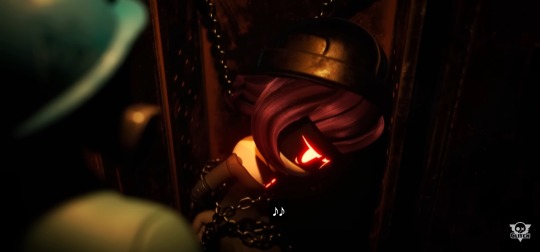
The lockers act as a storage container for the solver drones. But what about the image from ep6? It seemed like they had free reign over the office and could come and go. Even as far as a sentinel cuddling up to Nori. But that's the thing. Later we see that Nori and Yeva were the only ones that have been the MOST successful with the absolute solver experimentation. The others, were either corrupted or were unaffected.
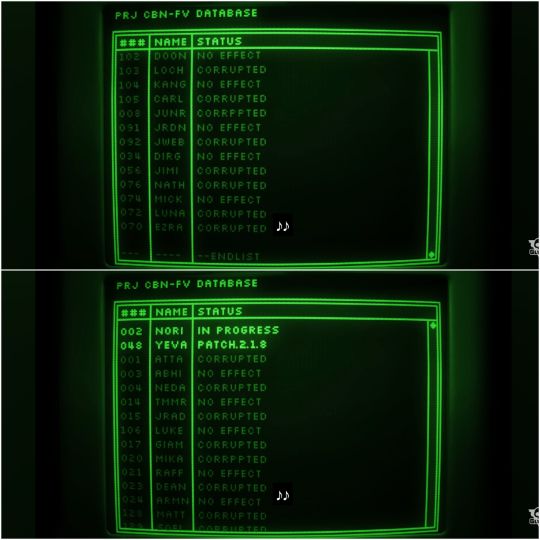
That means, in the time that the patches were given to the drones experimented on, was the time that they were allowed to be in the office. But as the patches and experimentation progressed, they were moved down for more security.
Soooo V. What are my thoughts on her and her whereabouts? The shot of the hall with the sentinels did not make it into the ep. Sure, it is probably fairly easy for them to get that shot. Especially if they kept the rig of the hall, throw around some sentinel bodies, and make the light go out. But this lack of V is what's making me still believe she's out there. Delusional, I know. But we don't get to see her eldrich form. This is the Absolute Solver that has been chilling in the labs, and simply recreates the hologram of all the drones it was ever a part of.
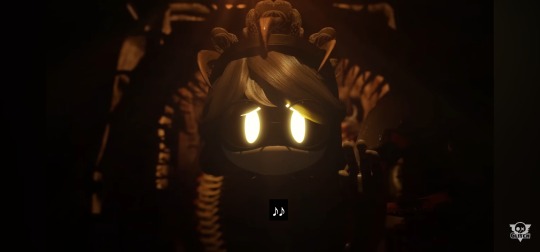
If V does not return by ep8, then I will lay her to rest properly. Until then, I'm marking her as MIA. She may be out there, she may not.
Alright, so the crucifix is also recounted as "failsafe USB (606b)" or at least that's how I see it, given the crucifix is just one fancy usb.
Now, the other time we did see the 606 was in the beginning of ep5.

wdOS_606 is basically the code that kills the drone and its core. So, effectively, that crucifix works as a kill code for the absolute solver. The timeline of events probably happened like this: Nori was showing signs of the Absolute Solver progressing much faster than any other drone the teams have worked with. One time, Nori went Absolute Solver crazy, the placement of the image that is also seen in ep6 suggests that this was the first or one of the first times Nori went rogue. The teams then decided to contain her better and suspended her by the chains, all the while waiting for the failsafe USB to be completed. At least, that was the plan. "Don't all die and almost let it out again lol. We're pretty mad but mostly scared about that." subtitle backs it up.
Now this.
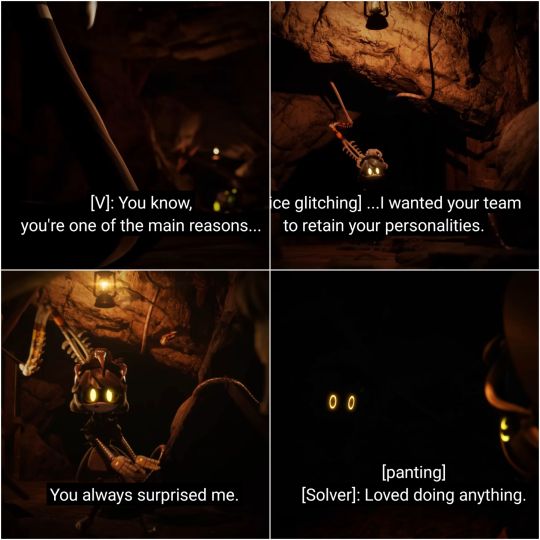
This entire sequence seems rather interesting. Absolute Solver, at its best, understands emotions on logical level. Its more like a math equation for it. As in: Bad things happen = changed and more subdued personalities. But with N, I suppose it found it rather interesting to watch him. Despite all of the bad experiences he may have had, he remained his happy self. The solver even went as far as quoting him.
That type of innocence, despite the horrors he has seen and committed, most likely amused the solver. So it allowed the team to retain those personalities and traits- also knowing that it could easily get rid of them if it really wanted to.
Uzi's administration rights still hold up. It seems that in this moment, the solver attempted to completely corrupt N and have him as a mindless drone that followed orders. Buuuut Uzi's admin rights denied that, saving him from becoming the solver's puppet and being what he was back on Earth during the massacre of humans.
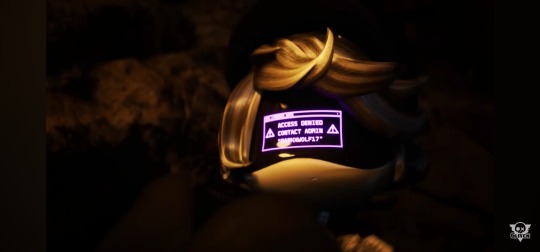
Eating is often referred to in this episode. Seems that I was somewhat right in regards to the Absolute Solver being the core of Copper-9 now. It has grown rather large, and taken possession of the entire planet. To maintain that, it needs sustenance. Be it in form of biological and mechanical life, or the planet itself.
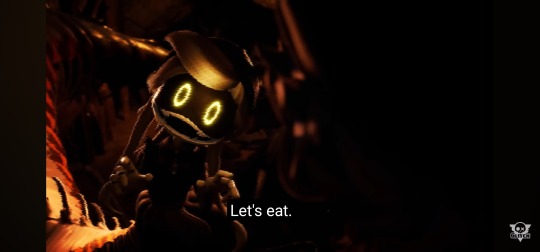
So J destroyed the only means of getting off the planet, and the possibility of saving themselves or the planets for the gang- of course there's still the pod that J is using, but that will not be given up without a fight.
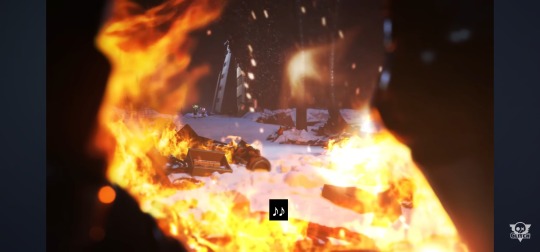
The issue here I have is... to whom did J give her loyalty to? Couple theories:
To Tessa- J has NO idea this is not Tessa, and is following her old boss just like in the days of the manor.
To Absolute Solver- J knows this is not Tessa, but still is loyal to it.
Issue: If number 1 is correct, then why follow through the plan with destroying the pod? It seems that was the case all along when Tessa told J to "mind her ship." Furthermore confusing to me is her comment.
Tessa: Her (Cyn) last known act was siccing you lot on other human exo-planets.
N: But why?
J: That's what we're trying to figure out, bozo.
J's line can be taken both ways. As 1- J is actually trying to figure out why Cyn is acting up. As for 2- this was simply a cover up for the whole plot.
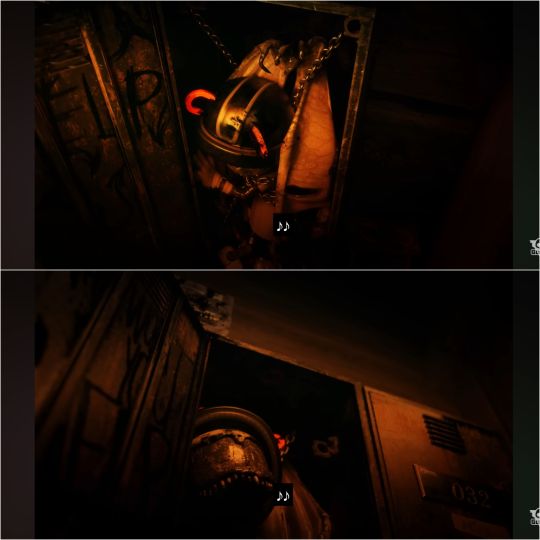
It seems here that the drones that were previously worked on simply stayed in their lockers and their corrupted form. But that was something that made me wonder. The drones were all corrupted with the Absolute Solver to some degree. They were all given patches of the solver- some had effect and others didn't. But that still means that there were a lot of drones that had their cores corrupted and look like Heart. Here's the question.
Why didn't they simply leave? Nori's corrupted core is fully sentient, despite being possessed by the solver the most. Of course, there is the possibility that whatever Nori created in the cathedral simply took those cores and dragged them into the center. Further growing itself. Ah, well I kind of answered my own question there.

So the largest number I could count was 129 on this list. Meaning, there were at least 129 drones experimented on. Seems to follow the crazy theory I had of the Absolute Solver taking control of the core. 129 minus 2 (Nori and Yeva) cores will definitely make a great impact/engrave itself into the planet in such a way and thus manifest the corridors of flesh and hands that go all to the way to Cabin Fevers camp ground.
It also seems that the Absolute Solver, instead of being injected straight into the drones, was done in patches. Now, my knowledge in computer language and science is non-existent, but it does make me wonder. Yeva has 2.1.8 patch, while Nori was still "in progress." This either implies:
Nori had a newer patch and this was the one that caused her to go so berserk they had to restrain her in the cathedral.
Nori did not have a new patch, the one that Yeva has was the latest one and Nori simply was not faring well in the transition.
Something I noticed/finally grasped on my 3rd watch through:
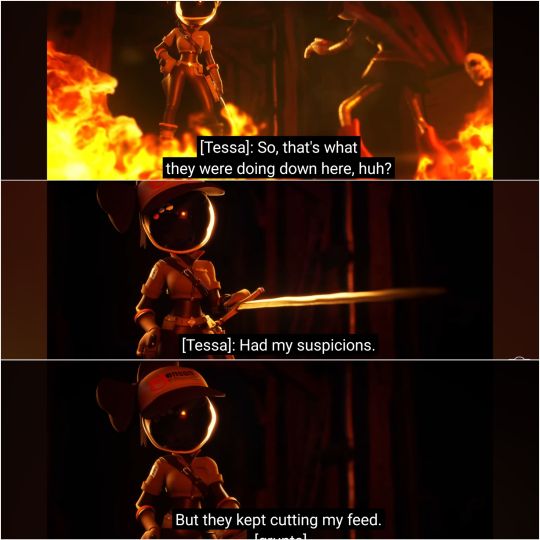
Who the hell is "they?" Well, my tired brain finally decided to kick in and work. "They" were the scientists. So the crucifix was something that the humans only now figured out how to make. The kill code that would put the Absolute Solver down. That was why the Solver was on Copper-9. It needed that crucifix, so it could get rid of it. "They kept cutting my feed." Most likely referred to when the hosts would become possessed by the solver. Just as seen with Nori, the second they went crazy, it was a quick shut down, thus cutting the feed for the Absolute Solver as it tried to figure out what they were doing.
So, just as many have theorized, Nori did cause the core collapse, but not in the way that I expected it. It's rather funny that instead of this being like a full Absolute Solver possession that caused this on purpose, was simply one bad event after another. And I love the show for this. Despite having the route that the Absolute Solver could have just imploded the planet on purpose and on its own (by possessing a host), it was instead a sequence of events that is similar to humans and their downfall. Nothing orchestrated, but just a compiling effect that created one huge problematic black hole.
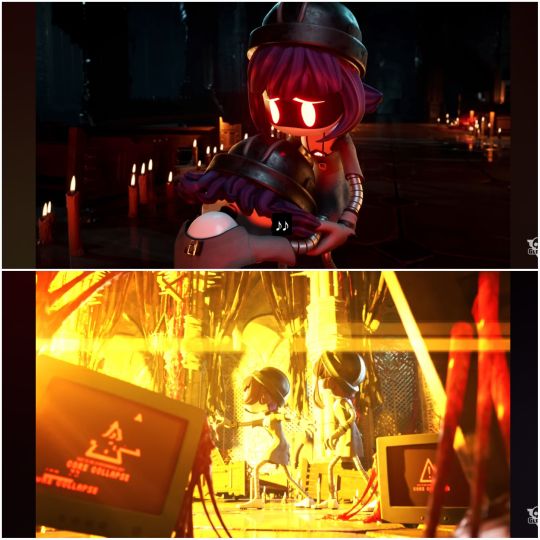
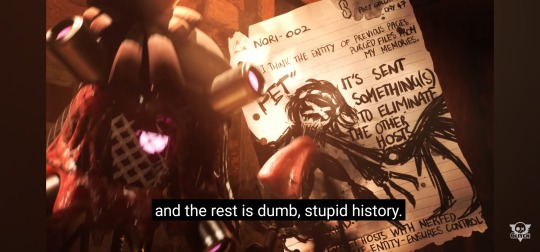
So this page does give some insight. The Absolute Solver sent DDs to wipe out the other solver hosts. (I'll touch on this in a different post) And the DDs were either referred to as "pets" by the Absolute Solver (which is more likely, as it called Uzi a "puppet") or a term that Nori coined. "Puppet hosts with nerfed ___ the entity-ensures control" The nerfed ___ is most likely their cores/thought process. As in, Administration CYN is what nerfed their abilities to remember anything regarding their past, and used that to control the DDs.
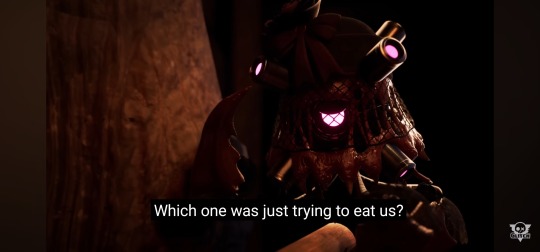
This was something I couldn't kind of settle with. Events wise, it can be assumed this is all happening at the same time. Just as Uzi is getting through the mine shafts and picking up the lantern, Tessa is blowing up the computer and nomming on Doll, and N is being dragged through corpse walls and being saved by Heart.
It was Doll- Although, the more I looked at this thought, the less likely this became. Doll's was intact when she came to warn Uzi, and stayed there until Tessa entity ate it towards the end of the episode. We have yet to see an instance where a core entered the Absolute Solver form and returned back to the core form without taking any damage. Specifically in J's case, the solver form was blown up and only then returned to the core form. Nothing was in the mine shafts that could have possibly injured it enough to go back to the core form and sneak back into Doll's body.
Tessa...uhh whatever the fack she is- Based off of Doll's getting attacked scene, the entity seems to have a rather quick ability in switching forms. So I wouldn't put past it that the entity attacked Doll, saw that another part of the Absolute Solver was trying to chase N down, and just went along with the rest of the solver to hunt him down.
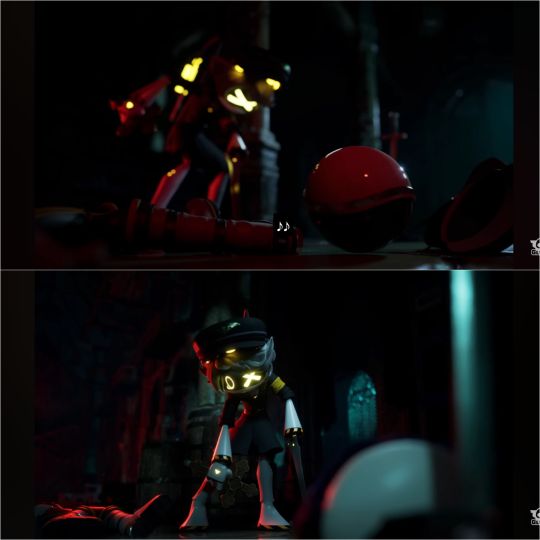
On my first watch through, I was worried that N would go crazy from breaking rule 1 of robotics: Not to injure humans. Granted, in the first watch through, everything went so fast that I barely had any time to grasp anything. After the second watch through, it becomes quite clear and apparent. The Absolute Solver took the rules of robotics out of the DDs. I mean, how else were they supposed to attack and kill the humans back on Earth. Furthermore, Tessa was not a human. So even if N did still have the rules of robotics programmed into him, they might not have set off. Why the "might not?" Because of the sentinel. Perhaps because the sentinels were created by humans, their ai is much simpler, but when that dingo bit Tessa, it had an aneurysm. It detected blood, and thus, the ai deduced that the sentinel just injured a human and decided to alt f4 itself. Would the same happen with N? I'm not quite sure. Given that the solver programmed the DDs, it could be either instance: Take the rules out completely or enhance the rules so that blood isn't what triggers the rule breaking.
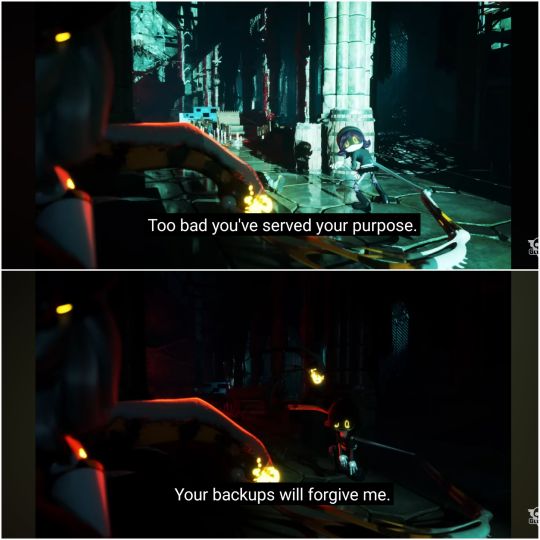
This is something that made me wonder. Did the DD trio go to any other exo-planets previously? I took this scene in two ways:
This has happened before. The solver knows that N will continue to forgive the Absolute Solver because something similar has happened before. As in, the solver is out to kill a planet, it does that, but in return sacrifices any DDs that might have been there to get rid of the potential solver hosts. The backups are booted and sent to a new planet.
This is the first time this happened, but the solver has previous experiences. Just as the solver had made N forget about his time in the mansion and the bloodbath of killing humans, it can do the same thing. Kill N, and make his backup version forget this ever happened.
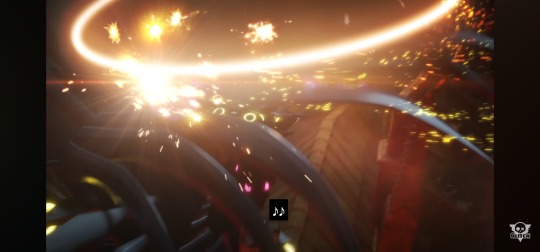
This one single frame made me wonder a bit too hard. The little nulls I assumed to be miniature and contained blackholes. But then when N dove under one... there was collision? A black hole, as far as I understand (which isn't very much ;w;), is something that cannot be touched. It warps time and space, so how are you supposed to be able to touch it? But I'm quite sure my tired brain is just thinking too much about simple details.

For some odd reason, I always thought that the solver wings were more flesh, and thus couldn't take too much damage. Proven wrong again! Uzi withstood N's firing and her wings came out undamaged.
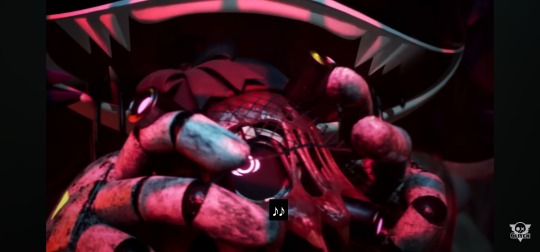
Main question for me: Why would the Absolute Solver eat the core? Specifically in drone form/possessing a host. If it was the hole that's in the cathedral, I can understand that somewhat better. But what does a solver drone gain from eating another corrupted core?
Perhaps acts as a power boost? Whatever the corrupted core can do, the powers are transfered uhh... somehow?
Simply sustenance, and a way to get rid of Heart, you're thinking too deep into this Ginkgo (more likely option) Plus, backed up by Tessa entity eating Doll's core and being unaffected. Perhaps it just remains in the body as a source of energy.

IC-0n IS THAT YOU?! XD But in all seriousness, this scene was intense. The animation, the music and sound effects, the lines, everything was executed perfectly and created the monstrosity that may or may not haunt my nightmare tonight :3
My first thought was, "OH YOU! YOU FINALLY SHOWED UP! ...... GO AWAY!" This entity... uh I'm not quite sure what to call it yet, has been teased all the way back to the poster. And I would like to bring back something I said a bit while back. "What if the double x'ed character is someone we already know... but is dead? A character that is confirmed/somewhat confirmed to be dead can return back to life, and their body forced to move by the absolute solver." (I will be delving deeper into debunking this in another post.) Welp, that does it. I had the idea, just didn't know who the fack it was. XD So we get a drone, wearing Tessa's skin.
In hindsight, there was a big fat foreshadowing that I took for granted. This thing.
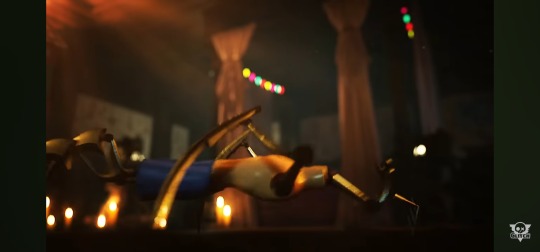
The drone body is a WD, and clear as day 1001 written on the core. What does it mean? Ah well, I'm actually not too sure. Going with the 002, 048, 029, etc. numbers, I can only assume 1001 is something the Absolute Solver made and gave it that number, possibly suggesting that there is more of these monstrosities out there.

So. Another "sacrifice." Why the quotation marks? Well... the first "sacrifice" was V and I'm still calling her MIA. Ginkgo, its clearly shown Uzi is most likely not gonna make it out of this one- shhhhhhhh, there is no war in Ba Sing Se. I will call Uzi MIA as well.
She's dead. The core was charging up behind her, much like it did when Nori's null hand fell, and when IC-0n- I MEAN- Tessa? The entity, jumped in. Uzi might just be the thing that sets the next core collapse- even the planet collapse- off. What Uzi is seeing, is just something that the Absolute Solver might have conjured up as her last memories before the imminent shut down.
She isn't dead. You see, this entire shot has me puzzled (nothing new lol). Your evidence for this one Ginkgo? Two images.
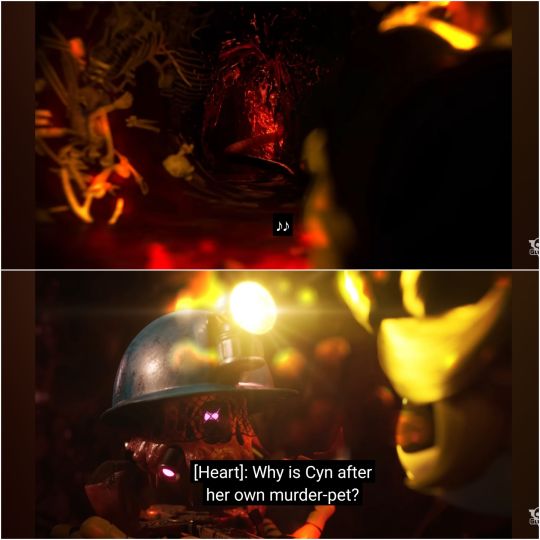
These scenes might not be much, but I will try to grasp at air here. It's unclear where Heart goes to. I mean there are two routes, one of which sounds more likely. First, she's going into the core because it connects to the entirety of the mine shafts and the core. Second, she's gonna use a door off to the side to go to the mine shafts and the same place that N gets dragged through. Why am I using these as poor evidence? Well, we've had 2 characters enter dark spaces full fo solver flesh and still make it out. Ginkgo, Uzi is literally falling in that scene, there is nothing to stop her fall. Yeah I know, like I said, I'm grasping at air with this one. Buuuut, the mind scape theories sound more fun, promise! ^w^

First off, where the HELL could this possibly be?
A memory/mind scape the Absolute Solver created: This has to be Copper-9, based off of the two iconic moons to the top right. A memory, because this could be either the first core collapse, or Uzi viewing the destruction of Copper-9 from another solver entity's point of view. Mind scape as in this is where the solver drone minds go to. Every solver drone that has been consumed by the large Absolute Solver in the cathedral, had their own personalities and thoughts. To keep them all from clashing and acting out, perhaps the solver takes the hive-mind plane and creates spaces that the solver drones can warp through.
The "ascension" plane: Ginkgo, that's it, to the hospital you go chop chop. /j Anyways, why am I even bringing something like this up? Well, Uzi's mural says this.
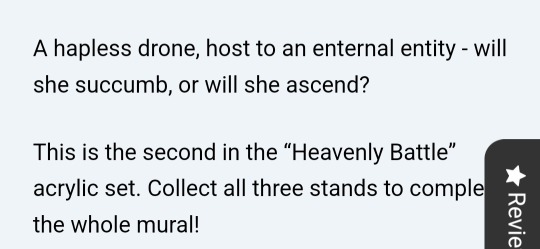
There are two routes here: succumb to be the host of eternal entity, or ascend. Ascend to... where? And how? Here is where the more intense crack theories enter (or at least for me). This space is the hive-mind of the solver, yes, but this is where Uzi's internal battle against the Absolute Solver will happen. We all know that the last mural will be of N fighting off the Absolute Solver (most likely). But what if he had outside (inside technically?) help. While N may hold out against the solver, he may need help to finally break through and finish it off. Who would be a better candidate than Uzi? She has now, for better or worse, become part of the large amalgamation that sits in the core. Perhaps with the strongest hosts in the hive-mind: Uzi, Nori, Yeva (maybe, I'm not quite settled on her yet), and Cyn, they will all be able to stop the solver for good on Copper-9. This process is the ascension. Instead of succumbing to the Absolute Solver within the hive-mind scape, she will fight once again. This time around, coming out victorious and ascending to uhh... I'm not quite sure yet? Robo-heaven? Returning back into her corporal body? Becoming the next Absolute Solver but with less need to rule the world? (Ah, well she might still actually rule the world just for the fun of it XD) Honestly, it's far too late for me to be thinking any more. I might add on to this later on.
Is it a rather optimistic take on the ending? Perhaps, but I need a little optimism right about now. ;w;
Want more of my stupid rambles? This has 3 other parts! ;w;
#murder drones#murder drones n#murder drones uzi#murder drones nuzi#murder drones theory#glitch productions#murder drones ep 7#murder drones episode 7#murder drones spoilers#murder drones tessa#murder drones yeva#murder drones nori#murder drones doll#murder drones absolute solver#murder drones j#murder drones v#uzi doorman#serial designation n#md uzi doorman#md uzi#murder drones serial designation n#md serial designation n#serial designation j#serial designation v#uzi x n#nuzi#bluginkgo's rambles/theories#md n#md theory
82 notes
·
View notes
Text
If Benjamin Netanyahu had accepted defeat in June 2021, finally yielding the stage to a coalition of his opponents, he could have retired at the age of 71 with a decent claim to having been one of Israel’s more successful prime ministers.
He had already surpassed the time in office of Israel’s founder, David Ben-Gurion, becoming the country’s longest-serving prime minister in 2019. His second stretch in office, from 2009 to 2021, coincided with perhaps the best 12 years Israel had known since its founding in 1948. The country enjoyed relative security, with no major wars or prolonged Intifadas. The period was one of uninterrupted economic growth and prosperity. Thanks to its early adoption of widespread vaccination, Israel was one of the first countries in the world to emerge from the coronavirus pandemic. And toward the end of that span came three agreements establishing diplomatic relations with Arab countries; more were likely on the way.
Twelve years of Netanyahu’s leadership had seemingly made Israel more secure and prosperous, with deep trade and defense ties across the world. But this wasn’t enough to win him another term. A majority of Israelis had tired of him, and he had been tainted by charges of bribery and fraud in his dealings with billionaires and press barons. In the space of 24 months, Israel held four elections ending in stalemate, with neither Netanyahu nor his rivals winning a majority. Finally, an unlikely alliance of right-wing, centrist, left-wing, and Islamist parties managed to band together and replace him with his former aide Naftali Bennett in June 2021.
At that point, Netanyahu could have sealed his legacy. A plea bargain on offer from the attorney general would have ended his corruption trial with a conviction on reduced charges and no jail time. He would have had to leave politics, probably for good. Over the course of four decades in public life, including 15 years as prime minister and 22 as the Likud party’s leader, he had already left an indelible mark on Israel, dominating the second half of its history. But he couldn’t bear the thought of giving up power.
Within 18 months, he was back as prime minister for the third time. The unwieldy coalition that replaced him had imploded, and this time around, Netanyahu’s camp of far-right and religious parties ran a disciplined campaign, exploiting the weaknesses of their divided rivals to emerge with a small parliamentary majority, despite still being virtually tied in the vote count.
Nine months later, Netanyahu, the man who promised, above everything else, to deliver security for Israel’s citizens, presided over the darkest day in his country’s existence. A total breakdown of the Israeli military and intelligence structure allowed Hamas to breach Israel’s border and embark on a rampage of murder, kidnapping, and rape, killing more than 1,100 Israelis and taking more than 250 hostage. The calamities of that day, the failures of leadership leading up to it, and the traumas it caused will haunt Israel for generations. Even leaving completely aside the war he has prosecuted since that day and its yet-unknown end, October 7 means that Netanyahu will always be remembered as Israel’s worst-ever leader.
How does one measure a prime minister?
There is no broadly accepted ranking of the 13 men and one woman who have led Israel, but most lists would feature David Ben-Gurion at the top. Not only was he the George Washington of the Jewish state, proclaiming its independence just three years after a third of the Jewish people had been exterminated in the Holocaust, but his administration established many of the institutions and policies that define Israel to this day. Other favorites include Levi Eshkol, for his shrewd and prudent leadership in the tense weeks before the Six Day War, and Menachem Begin, for achieving the country’s first peace agreement with an Arab nation, Egypt.
All three of these men had mixed records and detractors, of course. Ben-Gurion had autocratic tendencies and was consumed by party infighting during his later years in office. After the Six Day War, Eshkol failed to deliver a coherent plan for what Israel should do with the new territories it occupied and the Palestinians who have remained under its rule ever since. In Begin’s second term, Israel entered a disastrous war in Lebanon, and his government nearly tanked the economy. But in most Israelis’ minds, these leaders’ positive legacies outweigh the negatives.
Who are the “worst prime ministers”? Until now, most Israelis regarded Golda Meir as the top candidate for that dismal title. The intelligence failure leading to the Yom Kippur War was on her watch. Before the war, she rejected Egyptian overtures toward peace (though some Israeli historians have recently argued that these were less than sincere). And when war was clearly imminent, her administration refrained from launching preemptive attacks that could have saved the lives of hundreds of soldiers.
Other “worst” candidates have included Ehud Olmert, for launching the second Lebanon war and becoming Israel’s first former prime minister to go to prison for corruption; Yitzhak Shamir, for kiboshing an agreement with Jordan’s King Hussein that many believe could have been a significant step toward resolving the Israel-Palestinian conflict; and Ehud Barak, for spectacularly failing to fulfill his extravagant promises to bring peace with both the Palestinians and Syria.
But Benjamin Netanyahu now surpasses these contenders by orders of magnitude. He has brought far-right extremists into the mainstream of government and made himself, and the country, beholden to them. His corruption is flamboyant. And he has made terrible security decisions that brought existential danger to the country he pledged to lead and protect. Above all, his selfishness is without parallel: He has put his own interests ahead of Israel’s at every turn.
Netanyahu has the distinction of being the only Israeli prime minister to make a once reviled movement on the right fringe of the country’s politics into a government stakeholder.
Rabbi Meir Kahane, the founder of a Jewish-supremacist group called Kach, won a lone seat in the Knesset in 1984. He openly called for replacing Israeli democracy with a constitution based on the laws of the Torah and for denying Israel’s Arab citizens equal rights. During Kahane’s single legislative term, the entire Israeli political establishment shunned him. When he got up to speak in the Knesset, all of its members would leave the plenum.
In 1985, Likud joined other parties in changing election law so that those who denied Israel’s democratic identity, denied its Jewish identity, or incited racism could be barred from running for office. Under this provision, Kach was never allowed to compete in another election. Kahane was assassinated in New York in 1990. Four years later, a member of his movement killed 29 Muslims at prayer in Hebron, and the Israeli government proscribed Kach as a terror organization and forced it to disband.
But the Kahanists didn’t go away. With each Israeli election, they tried to rename their movement and adjust its platform to conform with electoral law. They remained ostracized. Then, in 2019, Netanyahu saw a roadblock on his path to reelection that they could help him get around.
Several Israeli parties had pledged not to serve in a government led by an indicted prime minister—quite possibly, enough of them to shut Netanyahu out of power. To prevent that from happening, Netanyahu needed to eke out every possible right-wing and religious vote for his potential coalition. The polls were predicting that the latest Kahanist iteration, the Jewish Power party, which is led by the thuggish but media-savvy Itamar Ben-Gvir, would receive only about 10,000 votes, well below the threshold needed to make the party a player on its own; but Netanyahu believed that if he could persuade the Kahanists and other small right-wing parties to merge their candidates’ lists into a joint slate, together they could win a seat or two for his potential coalition—just what he needed for a majority.
Netanyahu began pressuring the leaders of the small right-wing parties to merge their lists. At first the larger of these were outraged. Netanyahu was meddling in their affairs and, worse, trying to coerce them to accept the Kahanist outcasts. Gradually, he wore down their resistance—employing rabbis to persuade politicians, orchestrating media campaigns in the nationalist press, and promising central roles in future administrations. Media figures close to Netanyahu accused Bezalel Smotrich, a fundamentalist settler and the new leader of the religious Zionist party, of “endangering” the nation by making it easier for the hated left to win the election. Soon enough, Smotrich’s old-school national-religious party merged not only with Ben-Gvir’s Jewish Power but with an even more obscure, proudly homophobic party led by Avi Maoz.
Netanyahu did worry a bit about the optics. Throughout five stalemated election campaigns from 2019 to 2022, Likud coordinated closely with Jewish Power, but Netanyahu refused to be seen in public with Ben-Gvir. During the 2022 campaign, at a religious festival, he even waited backstage for Ben-Gvir to leave the premises before going up to make his speech.
Two weeks later, there was no longer any need to keep up the act. Netanyahu’s strategy succeeded: His coalition, merged into four lists, edged out its squabbling opponents with 64 of the Knesset’s 120 seats.
Netanyahu finally had the “right-wing in full” government he had often promised. But before he could return to the prime minister’s office, his allies demanded a division of the spoils. The ministries with the most influence on Israelis’ daily lives—health, housing, social services, and the interior—went to the ultra-Orthodox parties. Smotrich became finance minister; Maoz was appointed deputy minister in charge of a new “Agency for Jewish Identity,” with power to intervene in educational programs. And Ben-Gvir, the subject of numerous police investigations for violence and incitement over a period of three decades, was put in charge of a newly titled “Ministry of National Security,” with authority over Israel’s police and prison services.
As Netanyahu signed away power to the Kahanists, he told the international news media that he wasn’t forming a far-right government. The Kahanists were joining his government. He would be in control. But Netanyahu hadn’t just given Israel’s most extreme racists unprecedented power and legitimacy. He’d also insinuated them into his own formerly mainstream party: By March 2024, Likud’s candidates for local elections in a handful of towns had merged their slates with those of Jewish Power.
Likud long prided itself on combining staunch Jewish nationalism, even militarism, with a commitment to liberal democracy. But a more radical stream within the party eschewed those liberal values and championed chauvinistic and autocratic positions. For much of the past century, the liberal wing was dominant and provided most of the party’s leadership. Netanyahu himself espoused the values of the liberal wing—until he fell out with all the main liberal figures. By 2019, none was left to oppose the alliance with Ben-Gvir’s Kahanists.
Now more than a third of Likud’s representatives were religious, and those who weren’t preferred to call themselves “traditional” rather than secular. They didn’t object to cooperating with the Kahanists; indeed, many had already worked with them in the past. In fact, many Likud Knesset members by that point were indistinguishable from the Jewish Power ones. Israel’s worst prime minister didn’t just form an alliance of convenience with the country’s most irresponsible extremists; he made them integral to his party and the running of the state.
That Netanyahu is personally corrupt is not altogether novel in the history of the Israeli prime ministership. What makes him worse than others is his open contempt for the rule of law.
By 2018, Netanyahu was the subject of four simultaneous corruption investigations that had been in motion for more than a year. In one, known as Case 4000, Netanyahu stood accused of promising regulatory favors to the owner of Israel’s largest telecom corporation in return for favorable coverage on a popular news site. Three of the prime minister’s closest advisers had agreed to testify against him.
Investigations of prime ministers are not rare in Israel. Netanyahu was the subject of one during his first term. The three prime ministers who served in the decade between his first and second terms—Ehud Barak, Ariel Sharon, and Ehud Olmert—had all been investigated as well. Only in Olmert’s case did police deem the evidence sufficient to mount a prosecution. At the time, in 2008, Netanyahu was the leader of the opposition.
“We’re talking about a prime minister who is up to his neck in investigations and has no public or moral mandate to make fateful decisions for Israel,” Netanyahu said of Olmert. “There is a concern, I have to say real, not without basis, that he will make decisions based on his personal interest of political survival and not on the national interest.”
Ten years later, Netanyahu would be the one snared in multiple investigations. Then he no longer spoke of corruption in high office but of a “witch hunt,” orchestrated by rogue police commanders and left-wing state prosecutors, and egged on by a hostile news media, all with the aim of toppling a right-wing leader.
Netanyahu was determined to politicize the legal procedure and pit his supporters against Israel’s law-enforcement agencies and judiciary. Never mind that the two previous prime ministers who had resigned because of corruption charges were from the center left. Nor did it matter that he had appointed the police commissioner and attorney general himself; both were deeply religious men with impeccable nationalist backgrounds, but he tarred them as perfidious tools of leftist conspiracy.
Rather than contemplate resignation, on May 24, 2020, Netanyahu became the first sitting Israeli prime minister to go on trial. He has denied all wrongdoing (the trial is still under way). In a courthouse corridor before one session, he gave a 15-minute televised speech accusing the legal establishment of “trying to topple me and the right-wing government. For over a decade, the left wing have failed to do this at the ballot box, and in recent years have come up with a new idea. Elements in the police and prosecutor’s office have joined left-wing journalists to concoct delusional charges.”
The law didn’t require Netanyahu to resign while fighting the charges against him in court. But doing so had seemed logical to his predecessors under similar circumstances—and to Israel’s lawmakers, who had never envisaged that a prime minister would so brazenly challenge the justice system, which he had a duty to uphold. For Netanyahu, however, remaining in power was an end in itself, one more important than preserving Israel’s most crucial institutions, to say nothing of Israelis’ trust in them.
Netanyahu placed extremists in positions of power, undermined confidence in the rule of law, and sacrificed principle to power. Little wonder, then, that last summer, tensions over the role of Israel’s judiciary became unmanageable. The crisis underlined all of these reasons that Netanyahu should go down as Israel’s worst prime minister.
For 34 of the past 47 years, Israel’s prime ministers have come from the Likud party. And yet many on the right still grumble that “Likud doesn’t know how to rule” and “you vote right and get left.” Likudniks complain about the lingering power of “the elites,” a left-wing minority that loses at the ballot box but still controls the civil service, the upper echelons of the security establishment, the universities, and the media. A growing anti-judicial wing within Likud demands constitutional change and a clamping-down on the supreme court’s “judicial activism.”
Netanyahu had once minimized these complaints, but his stance on the judiciary changed after he was indicted in 2019. Indeed, at the start of his current term, Likud’s partners demanded commitments to constitutional change, which they received. The ultra-Orthodox parties were anxious to pass a law exempting religious seminary students from military service. Such exemptions had already fallen afoul of the supreme court’s equality standards, so the religious parties wanted the law to include a “court bypass.” Netanyahu acceded to this. To pass the legislation in the Knesset, he appointed Simcha Rothman, a staunch critic of the court, as the chair of the Knesset’s Constitution Committee.
He also appointed Yariv Levin, another fierce critic of the court, as justice minister. Just six days after the new government was sworn in, Levin rolled out a “judicial reform” plan, prepared by a conservative think tank, that called for drastically limiting the court’s powers to review legislation and gave politicians control over the appointment of new justices.
Within days, an extremely efficient counter-campaign pointed out the dangers the plan posed, not just to Israel’s fragile and limited democracy, but to its economy and security. Hundreds of thousands of Israelis protested in the streets. Likud began to drop in the polls, and Netanyahu privately urged the leaders of the coalition parties to delay the vote. They refused to back down, and Levin threatened to resign over any delay.
Netanyahu’s motives, unlike those of his partners, were not ideological. His objective was political survival. He needed to keep his hard-won majority intact and the judges off-balance. But the protests were unrelenting. Netanyahu’s independent-minded defense minister, Yoav Gallant, pointed to the controversy’s dire implications for the Israel Defense Forces as hundreds of volunteer reserve officers threatened to suspend their service rather than “serve a dictatorship.”
Netanyahu wasn’t sure he wanted to go through with the judicial coup, but the idea of one of Likud’s senior ministers breaking ranks in public was unthinkable. On March 25 of last year, Gallant made a public statement that the constitutional legislation was a “clear and major threat to the security of Israel” and he would not be voting for it. The next evening, Netanyahu announced that he was firing Gallant.
In Jerusalem, protesters besieged Netanyahu’s home. In Tel Aviv, they blocked main highways. The next morning, the trade unions announced a general strike, and by that evening, Netanyahu backed down, announcing that he was suspending the legislation and would hold talks with the opposition on finding compromises. Gallant kept his post. The talks collapsed, protests started up again, and Netanyahu once again refused to listen to the warnings coming from the security establishment—not only of anger within the IDF, but that Israel’s enemies were planning to take advantage of the country’s disunity to launch an attack.
The debate over judicial reform pitted two visions of Israel against each other. On one side was a liberal and secular Israel that relied on the supreme court to defend its democratic values; on the other, a religious and conservative Israel that feared that unelected judges would impose incompatible ideas on their Jewish values.
Netanyahu’s government made no attempt to reconcile these two visions. The prime minister had spent too many years, and all those toxic electoral campaigns, exploiting and deepening the rift between them. Even when he belatedly and halfheartedly tried to rein in the radical and fundamentalist demons he had ridden back into office, he found that he could no longer control them.
Whether Netanyahu really meant to eviscerate Israel’s supreme court as part of a plot to weaken the judiciary and intimidate the judges in his own case, or whether he had no choice in the matter and was simply a hostage of his own coalition, is immaterial. What matters is that he appointed Levin as justice minister and permitted the crisis to happen. Ultimately, and despite his professed belief in liberal democracy, Netanyahu allowed Levin and his coalition partners to convince him that they were doing the right thing—because whatever kept him in office was right for Israel. Democracy would remain strong because he would remain in charge.
Trying to diminish the powers of the supreme court isn’t what makes Netanyahu Israel’s worst prime minister. The judicial reform failed anyway. Only one of its elements got through the Knesset before the war with Hamas began, and the court struck it down as unconstitutional six months later. The justices’ ruling to preserve their powers, despite the Knesset’s voting to limit them, could have caused a constitutional crisis if it had happened in peacetime. But by then Israel was facing a much bigger crisis.
Given Israel’s history, the ultimate yardstick of its leaders’ success is the security they deliver for their fellow citizens. In 2017, as I was finishing my unauthorized biography of Netanyahu, I commissioned a data analyst to calculate the average annual casualty rate (Israeli civilians and soldiers) of each prime minister since 1948. The results confirmed what I had already assumed. In the 11 years that Netanyahu had by then been prime minister, the average annual number of Israelis killed in war and terror attacks was lower, by a considerable margin, than under any previous prime minister.
My book on Netanyahu was not admiring. But I felt that it was only fair to include that data point in his favor in the epilogue and the very last footnote. Likud went on to use it in its 2019 campaigns without attributing the source.
The numbers were hard to argue with. Netanyahu was a hard-line prime minister who had done everything in his power to derail the Oslo peace process and prevent any move toward compromise with the Palestinians. Throughout much of his career, he encouraged military action by the West, first against Iraq after 9/11, and then against Iran. But in his years as prime minister, he balked at initiating or being dragged into wars of his own. His risk aversion and preference for covert operations or air strikes rather than ground operations had, in his first two stretches in power, from 1996 to 1999 and 2009 to 2021, kept Israelis relatively safe.
Netanyahu supporters on the right could also argue, on basis of the numbers, that those who brought bloodshed upon Israel, in the form of Palestinian suicide bombings and rocket attacks, were actually Yitzhak Rabin and Shimon Peres, the architects of the Oslo Accords; Ehud Barak, with his rash attempts to bring peace; and Ariel Sharon, who withdrew Israeli soldiers and settlers unilaterally from Gaza in 2005, creating the conditions for Hamas’s electoral victory there the following year. That argument no longer holds.
If future biographers of Israeli prime ministers undertake a similar analysis, Netanyahu will no longer be able to claim the lowest casualty rate. His 16th year in office, 2023, was the third-bloodiest in Israel’s history, surpassed only by 1948 and 1973, Israel’s first year of independence and the year of the Yom Kippur War, respectively.
The first nine months of 2023 had already seen a rise in deadly violence in the West Bank and East Jerusalem, as well as terrorist attacks within Israel’s borders. Then came the Hamas attack on October 7, in which at least 1,145 Israelis were massacred and 253 kidnapped and taken to Gaza. More than 30 hostages are now confirmed dead.
No matter how the war in Gaza ends, what happens in its aftermath, or when Netanyahu’s term finally ends, the prime minister will forever be associated above all with that day and the disastrous war that followed. He will go down as the worst prime minister because he has been catastrophic for Israeli security.
To understand how Netanyahu so drastically failed Israel’s security requires going back at least to 2015, the year his long-term strategic bungling of the Iranian threat came into view. His mishandling didn’t happen in isolation; it is also related to the deprioritization of other threats, including the catastrophe that materialized on October 7.
Netanyahu flew to Washington, D.C., in 2015 to implore U.S. lawmakers to obstruct President Barack Obama’s nuclear deal with Iran. Many view this gambit as extraordinarily damaging to Israel’s most crucial alliance—the relationship with the United States is the very bulwark of its security. Perhaps so; but the stunt didn’t make subsequent U.S. administrations less supportive of Israel. Even Obama would still go on to sign the largest 10-year package of military aid to Israel the year after Netanyahu’s speech. Rather, the damage Netanyahu caused by presuming too much of the United States wasn’t to the relationship, but to Israel itself.
Netanyahu’s strategy regarding Iran was based on his assumption that America would one day launch an attack on Iran’s nuclear program. We know this from his 2022 book, Bibi: My Story, in which he admits to arguing repeatedly with Obama “for an American strike on Iran’s nuclear facilities.” Senior Israeli officials have confirmed that he expected Donald Trump to launch such a strike as well. In fact, Netanyahu was so sure that Trump, unlike Obama, would give the order that he had no strategy in place for dealing with Iran’s nuclear program when Trump decided, at Netanyahu’s own urging, to withdraw from the Iran deal in May 2018.
Israel’s military and intelligence chiefs had been far from enamored with the Iran deal, but they’d seized the opportunity it presented to divert some of the intelligence resources that had been focused on Iran’s nuclear program to other threats, particularly Tehran’s network of proxies across the region. They were caught by surprise when the Trump administration ditched the Iran deal (Netanyahu knew it was coming but didn’t inform them). This unilateral withdrawal effectively removed the limitations on Iran’s nuclear development and required an abrupt reversal of Israeli priorities.
Senior Israeli officials I spoke with had to tread a wary path here. Those who were still in active service couldn’t challenge the prime minister’s strategy directly. But in private some were scathing about the lack of a coherent strategy on Iran. “It takes years to build intelligence capabilities. You can’t just change target priorities overnight,” one told me.
The result was a dissipation of Israeli efforts to stop Iran—which is committed to the destruction of Israel. Iran sped further than ever down the path of uranium enrichment, and its proxies, including the Houthis in Yemen and Hezbollah on Israel’s northern border, grew ever more powerful.
In the months leading up to October 7, Israel’s intelligence community repeatedly warned Netanyahu that Iran and its proxies were plotting a major attack within Israel, though few envisaged something on the scale of October 7. By the fall of 2023, motives were legion: fear that an imminent Israeli diplomatic breakthrough with Saudi Arabia could change the geopolitics of the region; threats that Ben-Gvir would allow Jews greater access to the al-Aqsa Mosque in Jerusalem and worsen conditions for Palestinian prisoners; rumors that the deepening tensions within Israeli society would render any response to an attack slow and disjointed.
Netanyahu chose to ignore the warnings. The senior officers and intelligence chiefs who issued them were, to his mind, conspiring with the law-enforcement agencies and legal establishment that had put him on trial and were trying to obstruct his government’s legislation. None of them had his experience and knowledge of the real threats facing Israel. Hadn’t he been right in the past when he’d refused to listen to leftist officials and so-called experts?
Hamas’s surprise attack on October 7 was the result of a colossal failure at all levels of Israel’s security and intelligence community. They had all seen the warning signals but continued to believe that the main threat came from Hezbollah, the larger and far better-equipped and trained enemy to the north. Israel’s security establishment believed that Hamas was isolated in Gaza, and that it and the other Palestinian organizations had been effectively deterred from attacking Israel.
Netanyahu was the originator of this assumption, and its biggest proponent. He believed that keeping Hamas in power in Gaza, as it had been for nearly two years when he returned to office in 2009, was in Israel’s interest. Periodic rocket attacks on Israeli communities in the south were a price worth paying to keep the Palestinian movement split between the Fatah-dominated Palestinian Authority in the West Bank enclaves and Hamas in Gaza. Such division would push the troublesome two-state solution off the global agenda and allow Israel to focus on regional alliances with like-minded Arab autocracies that also feared Iran. The Palestinian issue would sink into irrelevance.
Netanyahu’s disastrous strategy regarding Gaza and Hamas is part of what makes him Israel’s worst prime minister, but it’s not the only factor. Previous Israeli prime ministers, too, blundered into bloody wars on the basis of misguided strategies and faulty advice from their military and intelligence advisers.
Netanyahu stands out from them for his refusal to accept responsibility, and for his political machinations and smear campaigns since October 7. He blames IDF generals and nourishes the conspiracy theory that they, in alliance with the protest movement, somehow allowed October 7 to happen.
Netanyahu believes that he is the ultimate victim of that tragic day. Convinced by his own campaign slogans, he argues that he is the only one who can deliver Israel from this valley of shadows to the sunlit uplands of “total victory.” He refuses to consider any advice about ending the war and continues to prioritize preserving his coalition, because he appears incapable of distinguishing between his own fate, now tainted by tragic failure, and that of Israel.
Many around the world assume that Israel’s war with Hamas has proceeded according to some plan of Netanyahu’s. This is a mistake. Netanyahu has the last word as prime minister and head of the emergency war cabinet, but he has used his power mainly to prevaricate, procrastinate, and obstruct. He delayed the initial ground offensive into Gaza, hesitated for weeks over the first truce and hostage-release agreement in November, and is now doing the same over another such deal with Hamas. For the past six months, he has prevented any meaningful cabinet discussion of Israel’s strategic goals. He has rejected the proposals of his own security establishment and the Biden administration. He presented vague principles for “the day after Hamas” to the cabinet only in late February, and they have yet to be debated.
However one views the war in Gaza—as a justified war of defense in which Hamas is responsible for the civilian casualties it has cynically hidden behind, or as an intentional genocide of the Palestinian people, or as anything in between—none of it is Netanyahu’s plan. That’s because Netanyahu has no plan for Gaza, only one for remaining in power. His obstructionism, his showdowns with generals, his confrontations with the Biden administration—all are focused on that end, which means preserving his far-right coalition and playing to his hard-core nationalist base.
Meanwhile, he’s doing what he has always done: wearing down and discrediting his political opponents in the hope of proving to an exhausted and traumatized public that he’s the only alternative. So far, he’s failing. Polls show that an overwhelming majority of Israelis want him gone. But Netanyahu is fending off calls to hold an early election until he believes he is within striking distance of winning.
Netanyahu’s ambition has consumed both him and Israel. To regain and remain in office, he has sacrificed his own authority and parceled out power to the most extreme politicians. Since his reelection in 2022, Netanyahu is no longer the center of power but a vacuum, a black hole that has engulfed all of Israel’s political energy. His weakness has given the far right and religious fundamentalists extraordinary control over Israel’s affairs, while other segments of the population are left to pursue the never-ending quest to end his reign.
One man’s pursuit of power has diverted Israel from confronting its most urgent priorities: the threat from Iran, the conflict with the Palestinians, the desire to nurture a Westernized society and economy in the most contested corner of the Middle East, the internal contradictions between democracy and religion, the clash between tribal phobias and high-tech hopes. Netanyahu’s obsession with his own destiny as Israel’s protector has caused his country grievous damage.
Most Israelis already realize that Netanyahu is the worst of the 14 prime ministers their country has had in its 76 years of independence. But in the future, Jews might even remember him as the leader who inflicted the most harm on his people since the squabbling Hasmonean kings brought civil war and Roman occupation to Judea nearly 21 centuries ago. As long as he remains in power, he could yet surpass them.
67 notes
·
View notes
Text
United By Music Hatred Of The Jury
Eurovision has been dogged by allegations of cheating, corruption, bad judging calls, and hatred of the jury for many years. This year brought that to a head with Sweden’s win over the public favourite Finland, in an allocation of points that shocked Europe.
Sweden received only 243 points from the public vote, without a single “douze points” from any country. Finland received 376 votes from the public, the second highest amount ever, including the coveted 12 points from eighteen different nation-states. How, then, did Sweden manage to win? Finland was only awarded 150 points by the professional jury, while Sweden was given 340, sailing their singer Loreen, a previous Eurovision winner, to victory.
Understandably, people are upset.
One reason that Finns have said it hurt to lose to Sweden is due to their history. Finland was colonised by Sweden for over 600 years, after Sweden annexed them (a long process lasting between the 1150s and 1350s at least). Sweden is still seen as superior in a number of ways. The Finnish language is often considered weird and ugly. Käärijä, the singer representing Finland, went to Eurovision to prove that a song sung in Finnish could win.
The professional jury clearly shows bias against songs sung in native and minority languages and not English. Time and time again, they vote for the most generic pop songs instead of performances laced with languages and culture from the performing countries. Last year in 2022, France sent a song in Breton, a language with a long history of oppression in France, with Celtic iconography. They received only 9 points from the jury. Meanwhile, audiences enjoyed the performance, and were happy that France finally sent something other than a modern chanson song, French audiences included. Keiino included aspects of Sami culture and language in their song in 2019, and lost out to the Netherlands, falling several places due to the jury vote. The Eurovision Song Contest exists to showcase and celebrate the full cultural richness of the competing countries, and it is wholly wrong for the jury to penalise that.
This argument is unhelped by those that often complain about the amount of Anglophone pop songs, yet then vote for the same due to loyalty, or the attractiveness of the singer, or politics. There is nothing wrong with voting for an English language pop song if you think it is the best song that year, but one way to help these non-English language songs is to allocate them a smaller amount of votes and save the rest for your favourite. This way these countries know that other people did enjoy their performances, and that they would like to see more of the same.
During its occupation by Sweden, Swedish became the dominant language in Finland, spoken by the upper class, administration, and education. It was only under Russian rule that the Finnish language started to gain traction and recognition, finally achieving equal status as Swedish legally in 1892. This is part of why it was so important to Finns to have a winning song sung in Finnish, their only previous win being in English. To show that their language is not rough and ugly sounding, and to demonstrate what it means to sing in your native language. The crowd sang along to Käärijä’s performance in Finnish; people who are not Finnish and have never spoken a word of Finnish. I cannot imagine that feeling. Käärijä also performed topless, with a perfectly normal body, unlike the heavily chiselled bodies favoured by Hollywood, which are, only produced by extreme diets, workout regimes, and dangerous levels of dehydration. It is no surprise he became a national treasure. Finland redecorated statues and had green shrines in their libraries and supermarkets. The country was so excited. Then they lost to Sweden over the jury vote.
Norway got the third highest votes this year from the public. They also won the televoting in 2019 too, but lost because of the professional jury votes that propelled Netherlands to the win. It was said that Norway may have had some voice trouble during the finals week, including her jury performance. The BBC praised her jury performance, but Swedish newspapers allegedly said it was very rough, and that she missed nearly every note.
The professional jury doesn’t judge the same Grand Final performance that everyone else sees. The jury judges the final jury performance, a separate show where the public is not allowed and only press accredited people can attend. Performers will obviously give it their best, but that does not guarantee it will be their best performance. It is also reasonable to assume that some singers might have a lower energy performance during the jury performance due to exhaustion, or in order to save up for the grand final, among other possibilities.
It is clear that everyone needs to be voting on the same show – anything else is just blatantly unfair. Votes cannot be accurately distributed if people are voting on two different shows.
If the juries are unbiased, we have a huge problem. Even if Finland got 12 points from everyone voting in the grand final, they would have only scraped a win with 11 points. They scored the second highest votes in Eurovision history, second only to Ukraine last year, a win that itself was mired in allegations of cheating and corruption. And yet Finland still lost.
The weighting of the votes is undoubtedly tilted towards the jury. As mentioned earlier, Finland received the second highest amount of televotes in Eurovision history, and won the public vote, yet lost to Sweden based on the professional jury. This is a kick in the face to members of the public that watched and voted. It sends a clear message that the public and their opinion clearly does not matter at all and they might as well have not voted. The public pay for Eurovision, the public stream and download and buy the songs, and as such, the publics vote should count, otherwise why bother? Why have a competition?
As it stands right now, the Eurovision Song Contest is essentially voted on like a US Presidential Election. The professional jury vote is essentially the Electoral College, capable of snatching the victory from the clear public winner that secured the majority of public votes. If we are going to complain about this system being used for American elections, then there is no reason that it should be acceptable here.
One way to fix this is to change the weighting of the jury versus public votes. The professional jury was established to prevent nations from simply voting for their neighbours or allies, yet it is remarkable how often the professional juries’ votes reflect these politics anyway. A 30/70 split to the public votes will allow the jury to make clear who they think should win while also not holding enough sway to alter the public results.
An overhaul also needs to be made to the professional jury itself. It is no secret that corruption is present within Eurovision. Keeping the names of the jury secret to prevent this from happening is only going to make it impossible to know when it has happened. Instead, the jury list should be transparent, and the juries themselves should be diverse, with a number of musical styles represented. Eurovision has a wide range of musical styles perform, and having a jury compiled of industry professionals from only one or two genres will only harm these entries, especially those that draw on traditional music styles. Many fan favourites were cheated by the voting system because their songs and performances weren’t “normal” or “palatable” enough for the jury. As mentioned earlier, these trend towards songs that have considerable influence from the culture of the country, including native and minority languages. It was also caused by the “war” between the juries, as evidenced by the graphic put out by Eurovision showing the difference between the jury favourites and the public favourites. Sweden and Finland sat in the middle of each half, essentially causing a fight over who would win by each half voting only for that one country.
Worldwide voting should also be removed. There should be a return to form when it comes to who can vote, as it was last year. Those that did not pay for Eurovision should not be able to vote, and worldwide politics could tip a win or loss by a considerable amount. The US has a population of almost 332 million people. India has a population of 1.408 billion. Imagine if any country with a population like this had even a fraction of its people cast a vote based on socio-political reasons.
Even within the voting process itself, there are problems. Votes should cost the equivalent amount everywhere. It ranges from 15p/17ct up to over a euro to vote, depending on where you are. This is going to have an impact on who can vote, and therefore who will win. Even on the app, it costs money to vote. This will not be a fair competition until everyone can vote equally and the organisers need to get on top of this rapidly.
Equality is the basis of every democratic vote, but Eurovision does not treat all of its competitors equally. The Eurovision Song Contest explicitly acknowledged the war in Ukraine and the need for another nation to host because of it. They sanctioned Russia by banning them from entering, this year being the second year in a row after their initial ban last year. This is considered the right thing to do, but it has raised several questions. The Eurovision Song Contest declined to let Ukrainian President Volodymyr Zelenskyy address the audience at the grand final, saying that it would politicise the event, ignoring the fact that they had already politicised it by acknowledging the very real events happening in the world that caused something as drastic as a change of host nation. They also politicised it by denying Russia entry. The politics are even implied in the theme. While seen as the correct thing to do, it means they have, to an extent, been hypocritical. They have then taken it one step further though, with the inclusion of Israel.
Israel’s participation has long been debated due to geographical location and politics. However, to ban Russia for the invasion and war against Ukraine while allowing Israel to compete is hypocrisy at its finest. Israel has carried out the same actions against Palestine as Russia has against Ukraine, yet they have not been banned. Instead, they have hosted in recent years, often receive a decent amount of points, and this year had a previous winner featured during the interval act. Many people with the job of awarding points made statements in support of “peace and unity!” only to immediately award points to Israel.
This disparity of treatment is most obvious at two previous competitions. Israel hosted in 2019 when the Icelandic group Hatari famously waved Palestinian flags during the grand final, causing them to be deported and banned from the country. They were later fined for breaking the no politics rule.
In 2021, the Israeli entry was a song called ‘Set Me Free’, a song title that was mocked and by many for its irony. The day before the grand final, Israel launched a missile strike against Palestine (reminiscent of the harrowing news that the hometown of the Ukrainian entry was bombed moments before they took to the stage this year simply from the other perspective) as part of a series of escalations that included threatening to evict Palestinian families from East Jerusalem and nightly clashes between Palestinians and the police during the Muslim holy month of Ramadan. Many people felt that it was wrong for the performance to go ahead. For a considerable time, YouTube searches for Israel’s grand final performance only returned results for the semi-final.
Despite all this, Israel faced no sanctions at Eurovision. Contrasted with Russia, who has faced sanctions for their actions in Ukraine, fans are understandably angry and upset with Eurovision’s lack of consistent positioning on this issue, calling for the end of the hypocrisy. The double standard shown here, in the disparity of Eurovision’s treatment of Russia and Israel, is a symptom of racialised Eurocentrism – something which remains a massive problem in Europe and a subject which deserves its own post.
Speaking of the war, the UK did not utilise enough Ukrainian talent, or songs. The UK hosted on behalf of Ukraine, yet little of Ukraine was represented. Previous performers Verka, Go_A, and Jamala (who herself faced controversy for her entry at the time, it being an allegory to Russia’s invasion of Ukraine in the same year as the title under the excuse of “allying with Nazis”) returned to sing their Eurovision entries, and last year’s winners Kalush Orchestra returned with an extended opening sequence. Beyond this, and one Ukrainian presenter, Ukrainian representation was far below what it should have been. Other Ukrainian groups or previous entries should have been invited to perform, and the three previous groups that performed should have had the option to sing additional songs if they wanted to. This was a serious let-down by the UK, especially given the interval performance. Famous songs of Ukraine could have been sung instead, or even some of those Liverpudlian songs translated into Ukrainian and sung by Ukrainian performers.
Moving on from those who didn’t perform to those who did: Loreen, too, is facing accusations of rudeness and arrogance. She has already won Eurovision once before and has returned to try and win again. The popular opinion is that those who have won Eurovision before should be allowed to return and perform as part of interval acts, but should not be allowed to enter again. It is unfair to the other contestants; they have already had their moment, and should move on to allow the new competitors a fair chance under the spotlight.
Viewers noticed that it was strange that the hosts kept mentioning Abba, and that a member of Abba even made a recorded appearance. Eurovision has nothing to do with Abba’s 50th anniversary next year. Abba won Eurovision for Sweden in 1974 when the UK hosted on behalf of Luxembourg. Now, 50 years later, Sweden wins Eurovision again, in the UK hosted on behalf of Ukraine, just in time for Abba’s big anniversary. No-one can deny that this coincidence seems suspicious, especially considering the jury versus public votes Sweden received and the landslide amount of votes won by Finland.
And that brings us to the plagiarism. Many fans say Loreen’s song this year, “Tattoo” is very similar to her previous winner ‘Euphoria’. An even more common accusation is that her song is very similar, or even identical to ‘Flying Free’ by Pont Aeri. Indeed, the openings are almost a complete match. It seems hard to believe that she could compose an identical opening without having heard the original at all. Sections of the instrumentals are also similar to Loreen’s entry.
Having not heard about this controversy before the grand final, the comparison this blog draws is with Abba’s ‘Winner Takes It All’. Perhaps this is why Sweden scored so many points from the jury this year? After all, Abba constructs very enjoyable, musically excellent songs. This was only noticed when my own father heard Sweden’s entry and began singing along with Abba’s lyrics, only realising that something was different when his lyrics didn’t match Loreen’s. He has been a fan of Abba since they won Eurovision and owns several records and CDs. And even he thought it was a dance remix of Abba.
During the judging section of the competition where the points are awarded, the crowd kept booing, and chanting Käärijä’s name and “cha cha cha” while the hosts were trying to announce Sweden’s victory. This chanting continued during Loreen’s victory song, as well as many other competitors immediately making their way to Käärijä to chant and support him. It was very clear who people thought the winner should be, and it was not Loreen.
No-one remembers who won the year Verka performed. They remember Verka. That’s what’s going to happen this year. This won’t be remembered as the year Loreen won Eurovision for the second time. This will be remembered as the year the juries finally went too far, and the year Finland was robbed.
Next year we should all just send our previous winners. And maybe question if Israel has a place in this competition anymore.
#eurovision#eurovision 2023#esc 2023#finland#sweden#uk#russia in eurovision#ukraine in eurovision#israel in eurovision#finnish people if we got anything wrong please let us know
203 notes
·
View notes
Text





ninjago OC !
been seeing a lot of dad! jay so i wanted to share my take on it :) lore is under the cut !!
TW abuse ! ALSO i am no means a writer and i’m definitely illiterate and this is my first time ever writing my ocs lore down (usually i keep it in my brain) so i hope it’s easy to understand 🥲 anywho
Ino is from the kingdom of wildness and is an oni. in oni cultural the runt of the litter is used to do all their dirty work, Ino being the weakest and youngest of his ‘family’ is abused, and treated like a slave.
when jay finds him he is malnourished and neglected, his hair is long and tangled, he has bruises and cuts on his face and old unclean bandages wrapped around his body. The oni have no use for ino, despite him doing all the chores around his house so jay buys him off of them.
it basically goes like this lol
jay- how much for the kid.
oni - ?????? bruh idk like 3 bucks
jay- k. *takes ino and leaves*
after the merge,Jay had taken refuge on a small inhabited island with a few other people from ninjago, they create a village, and are living quite nicely despite them living in a new world. Jay takes Ino to his home and get him cleaned up, but not a single time had ino said a word to jay, did they speak the same language? had he been so scared that he wouldn’t say anything? well it was both. Ino is in-fact, scared and can only speak the old tongue of the oni. Never in his life had he meet a human before, well besides that one fiery girl with red hair, who’s dragon attempted to eat him. but he didn’t count her, she was…. interesting. He did not speak their human language and he looked so different from him so why did the man in blue take him in? but that didn’t matter anymore, Jay had washed him up, gave him fresh clothing, cut his overgrown hair and nails as well as give him a name, a home, and most importantly, a family.
time skip a few years (it can vary depending on how long you think the merge timeskip was)
as time goes by jay teaches ino how to fight and how to maintain his oni powers, along the line he learns spinjitzu. a few years later when jay is corrupted by the kingdom of madness, he loses his memories and joins the administration, unknowingly jay passes his elemental power down to ino as way of saying goodbye.
and that’s kinda what i have lolz, somewhere along the line sora and arin see him doing spinjitzu and are like WOAHHH join our ninja team!!! but he doesn’t cause he’s awkward and wants to keep the jay situation a secret.
some facts! ~~
- ino is quite smart and it did not take him long to learn the ninjago language
- Despite being oni he mostly stays in his human form for fear of being judge
- i draw him with horns, but he canonically doesn’t have them unless his emotions get the best of him and struggles to keep his human appearance
- when he was younger jay had told him many stories about lloyd and wu as his way of saying “well not all oni are bad”, he even mentions mystake but leaves the part of him being drugged by her(season 8)
- jay had given him the name Ino, he saw somewhere that it meant storm and was like COOL but he wasnt aware that it also meant bad
- when ino talks about jay he refers to him as his father or dad, but never actually calls him that (jay has no problem referring to ino as his son)
- before the merge, when ino was younger, he used to play with wildfyre and even prank the lava-tides together, but their friendship didn’t last very long due to the onis and dragons hating eachother ( heatwave wouldn’t let wildfyre play)
- ino meets arin sora and wildfyre in a random village, they get to know each other but later that night the village is attacked by a strange monster. ino loses control of himself when he sees his new friends get hurt and loses control of his oni self.
#kunshoart#dad jay au#lego ninjago#ninjago#ninjago dragons rising#ninjago jay#suit jay#ninjago ino#cringe not me tagging my oc#oc art#oc#ninjago wildfyre#kunsho#kunsho oc
136 notes
·
View notes
Text
Wriothesley x Cannibal reader/oc hcs because I had this idea for days
Also, this somehow progressed into a Yandere fic with reader/oc being the Yandere, soo, read warnings carefully.
…totally didn’t get inspired by Kesha’s song Cannibal-
Warnings: Spoiler for Archon Quest 4.1, blood and gore mentions, usage of they/them pronouns for reader/oc insert, obsessive tendencies from assistant’s side, organ trafficking in a sense, implied? kidnapping, drugging, love drugging, stockholm syndrome, reader/oc is a literal maniac
…
Okay, so remember when the Traveler and Paimon were sent to the Fortress of Meropide to try and find that ginger man or whatever.
And during their time there, they come across a rumour circulating around that there were cannibals running around the pipes eating people?
While this was debunked at the end as a ploy by the trio in prison who were helping Childe with his escape, what if…
The cannibal was real?
And it wasn’t just any random inmate or guard.
It was the Administrator’s very own assistant.
They would listen to Wriothesley rant about how he had to deal with more of the more pesky and annoying criminals. Claiming that if only they would just disappear so that he could focus on other matters.
They took that to heart.
Whoever Wriothesley complained about, the assistant would always make sure that particular inmate was gone by the end of the week. No traces. In fact, the inmate’s belongings were gone as well.
They always, always somehow found a way to evade detection. Wriothesley questioning them in a panic because of the sudden disappearances? The assistant will just calmly reassure the Administrator that they probably just escaped, and are most likely dead.
Eventually over time, the rumors spread. And the prisoners stopped acting out of line for fear of being the cannibal’s next meal.
It works. But that’s only for the inmates.
Corrupt guards? Gone. Those who have been trashing the place just to abuse their authority over the inmates? Poof. Those in power who try to boss their subordinates around? Oh dear, their missing.
Eventually, nothing happened to the Fortress Of Meropide’s people anymore. At least it gave less work for Wriothesley.
But what of the assistant’s cannibalistic tendencies? Hah. Well, they never actually had much of an addiction for it until they accidentally got blood in their mouths. They got hooked on its taste. After killingkidnapping the unlucky person, they would usually consume the parts they deem most delicious.
After that, eyes, hearts, lungs, kidneys and the organs that are able to provide people with a better life are donated. The hospital never questioned the assistant. After all, it wasn’t that uncommon for prisoners to perish in prison.
But in the end, the assistant only did it just for Wriothesley. No other intention. They just wanted the Administartor to be less stressed.
They loved their boss. They want the best for the Adminstartor, and no one has any idea how far they are willing to go for Wriothesley. Absolutely no idea.
Of course, they know that if Wriothesley found out about his horrific deeds, they would be stripped of their honor and thrown into the cells just like any other inmate. That’s why they went to such lengths to ensure that their lovely boss would never find out.
They knew that Wriothesley ever found out, they would never see him again under friendly pretenses. Eventually, the paranoia would get to the assistant. One day, they’d place a simple but potent drug in Wriothesley’s tea. The man could never resist any, so when he finally realizes what happened, it was too late.
No one knew what happened to Their Grace. But they never questioned the fact that the assistant took over role of Administrator. It was a expected, being the man’s assistant after all, that they were most capable of taking over.
But what did happen to Wriothesley? No one knew. The assistant had carefully carved out their entire plan. Their Grace had decided that it was best for someone else to take over for them.
Meanwhile, Wriothesley was in the assistant’s house. No matter how hard he struggled, the house was escape proof. No matter how many insults Wriothesley threw at them. No matter how hard the man refused to eat any food or even tea prepared for him.
It hurts at first, but the assistant knows that the man will come to love him eventually. One day, Wriothesley, the man they’ve loved for so long, would finally understand how much effort they had put because they wanted him. Maybe then, he’ll finally accept his fate.
Wriothesley will finally realize one day that their darling assistant loved them! That’s why they went as far as to take care of those pesky inmates and inefficient subordinates! That’s why they went as far as to chain Wriothesley in a room that they had designed and prepared just for his liking! They were his one and only assistant after all…
If not? Well, chemistry and a bit of magic can help with this particular problem in no time..~ They’ll figure out a way to make Wriothesley ingest it, and he will love them in no time! There isn’t much difference, it just speeds up the process! They know that Wriothesley loved them as well, why not help him realize those feelings sooner?
Wriothesley will learn to enjoy his new life. His new life of being pampered, loved and cared for by his darling assistant, they know he will, soon enough.
I’ve always loved you,Your Grace. You only need me, and I only need you~
#cw: gore#cw drugging#cw cannibalism#genshin impact#genshin impact x reader#genshin#genshin impact original character#genshin oc#genshin impact oc#sub genshin#genshin x you#genshin x reader#genshin imagines#genshin spoilers#wriothesley#wrio x reader#wriothesley x reader#wriothesley x you#wriothesley x y/n#wriothesley x oc#sub wriothesley#i think?? idk#yandere reader#scratch that reader’s a literal maniac jeez#romantic yandere#reader is cannibal#cannibal reader#cw love potion#cw organs#cw blo0d
140 notes
·
View notes
Text
💢 Very interesting indeed! Check this out!!🧐🤔⬇️
LAW OFFICES OF AISSA WAYNE (John Wayne's Daughter) Obama's SS Number
For those of you who don't know but at the very bottom of this article the attorney who authored this article is John Wayne's daughter, Aissa Wayne, also a USC graduate.
Well, Well, Well, it looks like someone thoroughly checked this out! I was wondering who was going to do research into President Obama's Social Security number.
Jean Paul Ludwig or Barack Hussein Obama? S . S . N#042-68-4425
WOW, read this, it's short - very interesting.
An intensive 6-year investigation has revealed the identity of the man whose Social Security Number (SSN) is being used by President Obama.
Jean Paul Ludwig, who was born in France in 1890, immigrated to the United States in 1924, and was assigned SSN 042-68-4425 (President Obama's current SSN) rec'd on or about March 1977.
Mr. Ludwig lived most of his adult life in Connecticut. Because of that, his SSN begins with the digits 042, which are among only a select few reserved for Connecticut residents.
Barack H. Obama never lived or worked in that state! Therefore, there is no reason on earth for his SSN to start with the digits 042. None whatsoever!
Now comes the best part! J. P. Ludwig spent the final months of his life in Hawaii, where he died.
Conveniently, Obama's grandmother, Madelyn Payne Dunham, worked part-time in the Probate Office in the Honolulu Hawaii Courthouse, and therefore had access to the SSNs of deceased individuals.
The Social Security Administration was never informed of Ludwig's death, and because he never received Social Security benefits there were no benefits to stop and therefore, no questions were ever raised.
The suspicion, of course, is that Dunham, knowing her grandson was not a U.S. Citizen, either because he was born in Kenya, or became a citizen of Indonesia upon his adoption by Lolo Soetoro, simply scoured the probate records, until she found someone, who died who was not receiving Social Security benefits, and selected Mr. Ludwig’ s Connecticut SSN for her grandson, Barry Obama.
Just wait until the head Birther himself, Donald Trump, gets past the birth certificate and onto the issue of Barry O's use of a stolen SSN. You will see leftist heads exploding, because they will have no way of Defending Obama.
---------------------------------------------------------------------
Although many Americans do not understand the meaning of the term "natural born", there are few who do not understand that if you are using someone else's SSN it is a clear indication of fraud, and a federal offense.
Let's all get this information out to everybody on our mailing lists. If the voters of this great nation can succeed in bringing this lying, deceitful, cheating, corrupt, impostor to justice it will be the biggest and best news in decades for our country and the world.
"In God We Trust."
84 notes
·
View notes
Text

Republicans nowadays don't care about national security. They don't seriously care about the economy - except for tax breaks for filthy rich contributors. And they certainly don't care about law and order as they make excuses for the corrupt insurrectionist leader of their party.
The only thing most members of the GOP care about is their idolatrous worship of Donald Trump and placating him at all costs.
You can make Republicans' 2024 Christmas the most miserable ever by getting like-minded people to register and vote.
You know what's on the line; convincing others of the catastrophe of any GOP administration needs to be a high priority.
Be A Voter - Vote Save America
Remind people that if they've moved since the last time they voted, they need to register at their new address. Voter registration is extremely geographic.
#republicans#ghost of christmas past#christmas#charles dickens#register and vote#donald trump#democracy on the line#vote blue no matter who#election 2024#dave whamond
21 notes
·
View notes
Text
World Building in Five
Thank you for the tag @kaylinalexanderbooks
I’ve looked forward to doing this for The Blood Cleaners ever since I saw it.
Rules: post 3-5 pictures that capture a setting in your world and tell us about it!
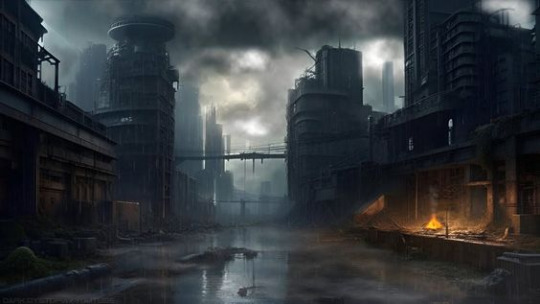
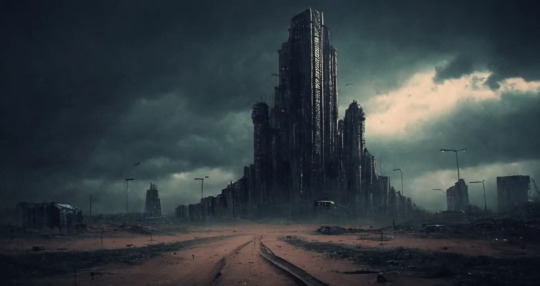



Source 1: Thumbnail of Dark Dystopia video
Source 2: Still image from Earth’s Last Echoes video
Source 3: Photo of Quarry by Claude Meyers on Pinterest
Source 4: artstation.com
Source 5: Thumbnail of Selcuk Celebi Ambient & Music video
The Blood Cleaners takes place hundreds of years into the future (no specified year). The setting is a city called Corpa, located in post-apocalyptic Arizona. Corpa is not the ruins of a real life city. It is a city that was formed after the great nuclear war (which they call The Last War).
There are nine sections of Corpa. There’s the Steel Castle, often called the Steel, a fortress that looks like a cluster of skyscrapers fused together. It’s hard for me to find or create an image that portrays what the Steel is supposed to look like. I found a great image from a still in a YouTube video by Earth’s Last Echoes that conveys what I had in mind. I also use the image from Artstation to show the aesthetic of the city in the middle of the desert, though Corpa is not in ruins. The Steel is the home of the Fists, the ruling class of Corpa.
The underground section is a series of tunnels that are built to be like a bunker. The underground consists of many storage rooms, closets, homes, labs, classrooms, medical bays, cafeterias, shops, offices, gymnasiums, and a boiler room. I use a thumbnail from a video by Selcuk Celebi Ambient & Music to portray what a home in the tunnels would look like. The tunnels mostly house the poorest residents of Corpa. Even tunnel workers with well-off occupations like teachers and doctors are less prosperous than their surface counterparts. One cool feature of the tunnels are the vaculators, big holes where garbage is dumped and transported through ducts to the incinerator. People who live in the tunnels are called Tunnelers.
The surface section consists of the city above ground, the urban and suburban areas surrounding the Steel. The urban area includes a section of administrative buildings where the Fists carry out their government jobs. The surface is made up of many hospitals, shops, restaurants, houses, schools, research labs, parks, office buildings, and plazas. People who live on the surface are called Surfacers, including those who don’t live in the urban or suburban sections, but do live in the farmland, lumber farm, industrial district, energy district, quarry, or mine.
The farmland is the spacious section of land used for agriculture purposes. They grow the crops and raise the livestock that feeds most of the city.
The lumber farm is a lumber mill in the midst of a forest grown for the purpose of providing lumber for the city.
The industrial district is made up of many factories used for making anything and everything used in the daily lives of Corpa’s residents. I portray the factory district using a thumbnail from the YouTube channel Dark Dystopia. It portrays the overall mood of the setting.
Past the factory district are the rocky areas where quarries and mines can be found. I chose to include an image of a quarry because this location is especially important to the plot. The quarry workers live under especially harsh conditions.
The city is surrounded by the energy district, which consists of solar panels and wind turbines that provide electricity.
Corpa covers a fifty mile radius, which is 2500 square miles. There are some other interesting aspects of Corpa that I’m going to have to keep secret because they would be plot spoilers. The residents of Corpa have been fed misinformation about the city’s founding and purpose by their corrupt, totalitarian government. The plot involves MC Justin uncovering the secrets of the city.
Tagging: @buffythevampirelover @tryingtowritestuff24 @selenekallanwriter @constellationandcompendium @gottestod-writes @willtheweaver @poethill @primroseprime2019
#writing#writeblr#writers on tumblr#creative writing#world building#the blood cleaners#dystopia#post apocalyptic#young adult#world development#world design#wip#my wips#wip intro#novel writing#novelist#writer tag#tag game#open tag#scifi#writer#fiction writing
11 notes
·
View notes
Text
Kim Dotcom
Bad news for the West: Russia will spend $160 billion on defense and security in 2024 and the Russian Finance Minister calls it the victory budget. Russia pays 75% less for similar or better weapon systems compared to the US / NATO because Russia doesn’t allow its defense industry to rip them off. So any plane, missile, tank or artillery ammunition costs Russia only 25% of what the US is paying. This means that a $160 billion Russian military budget is comparable to $640 billion in the United States. It’s also worth noting that Russia doesn’t waste trillions on fancy Navy ships and fighter jets that don’t work. Instead it has focused on building the most powerful nuclear arsenal in the world, long range hypersonic missiles that can sink airplane carriers and autonomous nuclear powered torpedoes that travers the oceans without ever needing to refuel. They carry the largest nuclear warheads known to men and are nearly undetectable. Imagine the most powerful nuclear explosion on the shores of New York City generating a hundred meter tall tsunami of radioactive water destroying the entire city and turning it into an uninhabitable wasteland for centuries. In addition Russia has a fleet of Super EMP satellites in a high orbit above Earth with nuclear payloads. When detonated they can destroy the entire power grid and all civilian telecommunication systems in the US in an instant. The US military is used to fighting the least sophisticated enemies. It’s easy to bully any nation that doesn’t have peer capabilities. The US Govt killed over 20 million people in 37 victim nations since WW2 but it never bullied anyone who could destroy the United States, until now. Americans and citizens of NATO countries need to understand that the West cannot win against Russia on the battlefield. Every day without diplomacy and peace negotiations is bringing humanity closer to self-destruction. You already know that the Biden administration is the most inept and embarrassing Government America has ever had. Don’t let those arrogant, corrupt and incompetent fools destroy the world. Demand peace. Don’t wait until it’s too late.
14 notes
·
View notes
Text
These days, we hear numerous specious complaints of "cultural appropriation", often connected to a celebrity perceived to be in the wrong.
But when there's real cultural appropriation, such as the Palestinian Authority's recent bid to erase Jewish history in Jericho, those who are usually so vocal fall silent.
In fact, the Palestinian Authority's latest attempt to claim that Jericho is actually called Tell es-Sultan and is in 'Palestine' is worse than cultural appropriation: it's outright falsification of history and ethnic erasure of the Jews.
As Robert Williams explains in the above article, Jericho was built long before any Arab and/or Muslim ever arrived in the land. In fact, Jericho is older than the Jews too. To give an Arabic name that has no historical connection with the site is clearly a political decision, and UNESCO has fine form with putting politics ahead of historical facts.
In the past, UNESCO has falsely attributed Jewish holy sites to the Palestinians and to Islam. Consequently, the United States withdrew from UNESCO under the Trump administration. Biden has returned to it to counter Chinese influence, a statement that only reveals just how compromised UNESCO has become.
As I have said many times before, the reason for Palestinian falsification and erasure of Jewish history is simple: countless pieces of archaeological evidence prove that the Jews had a national homeland in Israel, which was only relinquished temporarily due to foreign invasion. The historical record shows consistent resettlements of Jews throughout the land ever since the last great expulsion of 70 CE.
This is why the Jews are the sole people with a national entitlement in Israel, a fact that was affirmed at the San Remo conference in 1920 and later by the League of Nations. This right never prevented Arabs from living in Mandatory Palestine (or even from having a state in some parts of it), but it did confer on the British Empire a responsibility to settle the Jews.
Despite the lies of Mahmoud Abbas at the United Nations this year, the British Empire actually reneged on that obligation in favour of the Arabs. Most of Mandatory Palestine became Jordan, and Jews were restricted from purchasing housing in most of the tiny remainder. (Hence the increasing militancy of Zionist groups in the 1940s, fighting against the White Paper.)
The 1947 Partition Resolution would have granted Arabs sovereignty in the majority of the western part of the Mandate, effectively creating two states for them. But the Arabs rejected this, with the Arab Secretary General at the time threatening a monumental massacre of the Jews in response.
All of this historical background is crucial, as it demonstrates the malevolent deceit of the Palestinian Authority today. Without acknowledging the multiple opportunities it has had for a Palestinian State, the dictatorship pursues an inherently racial annihilationist goal of erasing all Jewish history from the land by seeking international validation for anti-historical lies.
And the feckless political merchants at UNESCO continue to accept this strategy, a strategy that is applied to no other ethnic and national group.
I hope that anyone with a conscience at UNESCO will reject this latest attempt at anti-Jewish ethnic erasure by the Palestinian Authority, but after their previous, hallucinatory decisions, I am not holding my breath.
#unesco#jericho#israel#support israel#stand with israel#i stand with israel#god bless israel#the bible#palestinian#mandatory palestine#british empire#league of nations#israeli history#racism#palestinian racism#antisemitism#united states
20 notes
·
View notes
Text
On today's Ginkgo rambles, we have
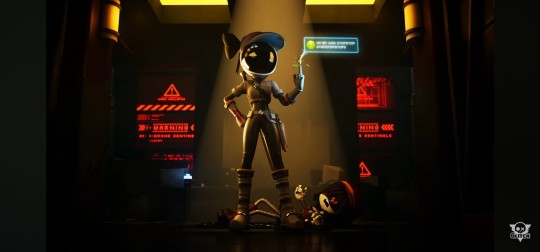
what is going on with Tessa and why I find her very suspicious.
Spoilers, duh
The main thing that glares at me is how she interacts between the team and what she says. Or, more specifically, how inconsistent she is with the information she gives us. When we first see her, she says:

"Her [Cyn] last known act was siccing you lot on human exo-planets."
N: "But why?"
J: "That's what we're trying to figure out, bozo."
And-

"If she [Cyn] wants these labs. We burn them down!"
But later, she switches it up.
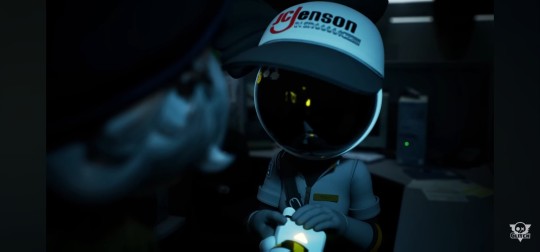
"When we get to the lab and find that list..."
Why was there a switch? She went from "we are burning this sh*t down!" To "I actually need the labs to get the list of drones that are infected."
So what gives?
The only thing I can see is J's presence. It's strange too isn't it? Tessa specifically told J to stay back and mind her ship. Illiciting this weird pause in the trio.
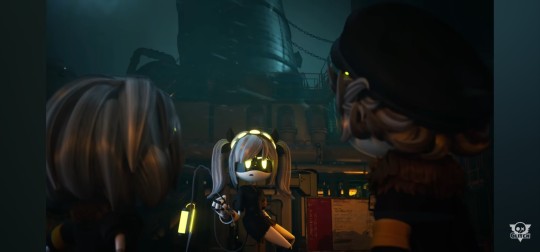
The entire time in N's memories/flashback, it's shown that J follows Tessa all over. Granted, N's memories are a bit of a shaky land to base anything off of. Many of the things that happened in N's memories did not actually happen in real life. More specifically, the gala massacre happened, yes. But N, V, Tessa, and J most likely did not fight eldrich Cyn like in Episode 5, Home. Given that we have nothing else, we can at least infer that J and Tessa are pretty close friends- specifically taking the scene when Tessa asks J to act as a "ripping royal stud." J, who we have seen to be very strict, showed concern for Tessa's hand injury (which is another thing I'll touch on).
With all this in mind, why would Tessa do that? They've been together ever since the first clip of then in episode 3, The Prommening. Why would Tessa forgo the extra security that J provides? Supposedly, Tessa knew that N and V have forgotten about her due to the CYN administration program. We see this from when Tessa first interacts with them,
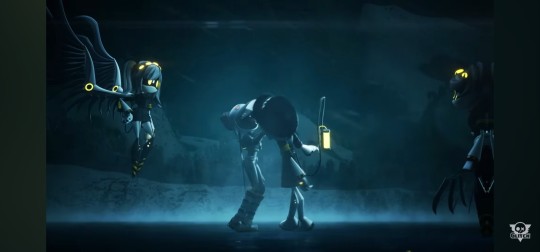
"N! You remember- *cough cough*" It seems that she knew that N and V, to some degree, do not remember her or working for her as butler and maid. That detail would put her at a risk, wouldn't it? N and V are almost like strangers, not to mention Uzi bit her the second she got close enough. Having J with her would be safer for her. Instead, she tells J to mind her ship.
Now, there are a couple of things that I could think of.
1. J is a liability somehow. This is the more insane and unhinged idea, therefore has more holes. But basically, the thought is that the absolute solver somehow has a stronger hold on J and is using her to gather data on Tessa's movements. Tessa might have realized that the corrupted core with ths absolute solver in J is a liability to what Tessa is actually trying to do. Therefore, she says "we burn the labs!" When J is there, but when she's gone Tessa switches to her true goal which is "get the list." There is a glaring hole here tho. How would Tessa know that the corrupted cores in N and V do not have a strong hold on them? Maybe the hint to her was that N remembered her. But J hasn't shown signs that she doesn't remember Tessa either. But the counter to that could be that J views Tessa as a JcJenson technician, therefore Tessa is already supposed to have that level of respect/loyalty.
2. J is backup. This would make more sense. We can't have the entire gang going down into the labs, and not have someone as backup in case things go south. They'll need someone to either drag them out or finish the job of burning the labs down if the gang isn't successful.
3. Tessa herself is what's weird. J, N, and V are all acting like themselves, the only person that we've seen to have a change in their personality is Tessa. Maybe Tessa is posessed with something something, more unhinged idea rant. But you get the idea. Of course, no one can go through seeing your parents and friends killed, and then kinda causing the fall of the entire planet earth and come out with the same personality as you had originally. So maybe, she simply matured rapidly, and that gave her the more cold side we often see throughout Episode 6, Dead End.
I'm mostly very suspicious of Tessa because V was too. While the trio were making their way over to the elevator, V had one of her eyes/sensors on Tessa the entire time.
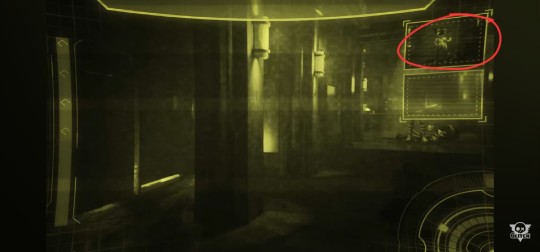

After V saw that Tessa was no longer trustworthy and that the sentinels did not listen to her, she stopped following along with Tessa. Just as many more people have mentioned, it's really sad how V's true personality and care only shone in the second half of episode 6. How protective V became of Uzi and N. Taking lead while walking down the corridor, and taking lead in fighting the sentinels.
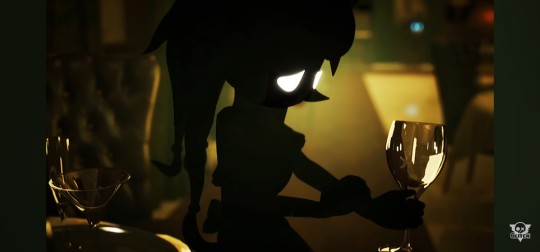
Now as for this! Tessa's hand injury, or something at least being wrong with her hand. Liam would not include this just because. Something is wrong with her left hand, and we have to keep that in mind for some odd reason. I have a feeling that the injury will come up later in eps 7 and 8. Perhaps if the theory of this Tessa being the imposter, then the gang will have to figure it out by basing it off of Tessa's left hand injury. That, or maybe this Tessa is the real one, and the injury might cause a hiccup in the fight that is gonna go down in ep 7 or 8.
Of course, as per usual, I could simply be looking in too deep to this. Feel free to gut this! ^_^
#murder drones theory#murder drones#glitch productions#serial designation n#uzi doorman#serial designation v#md uzi#md uzi doorman#md n#md v#md serial designation n#murder drones serial designation n#serial designation j#the absolutesolver#murder drones absolute solver#absolute solver#murder drones tessa#tessa james elliot#murder drones v#murder drones n#murder drones uzi#n murder drones#murder drones episode 6#murder drones episode 5#bluginkgo's rambles/theories
71 notes
·
View notes
Text
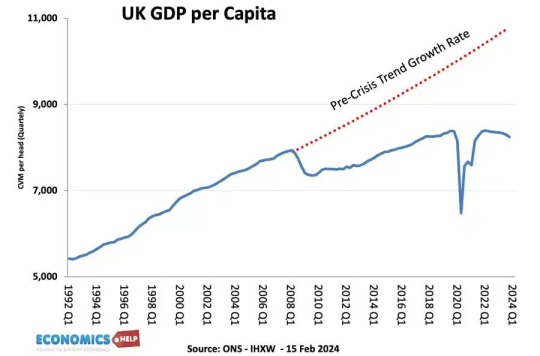
You cannot understand the failure of Conservative rule unless you accept that we are living with the failure of honestly held Conservative beliefs. The UK is in crisis, not because Tories are criminals or charlatans or fools, although they can be all of these things, but because they tried to govern according to their sincerely held beliefs and sent us into a deep crisis.
I accept that this is a hard concession for the government’s opponents to make. They like to think of Conservatives as crooks. And they are right in part. The Tory administration from 2010 to the present, which offers peerages for £3 million to passing bidders, has been the most corrupt government of the modern era.
Why, then, pay these crooks the courtesy of taking them seriously?
Meanwhile, those of us brought up in the British class system have a second reason for refusing to offer Conservatives the smallest mercy.
David Cameron, George Osborne, Boris Johnson, Rishi Sunak, and, for a while, their Liberal sidekick Nick Clegg, fit our resentful image of dilettantish public-school boys: foppish wreckers, who do not care about the damage they inflict as long as they can stay at the top of the heap.
I have lost count of the number of times anti-Tory columnists have reached for F. Scott Fitzgerald’s lines from the Great Gatsby to describe our rulers.
“They were careless people, Tom and Daisy – they smashed up things and creatures and then retreated back into their money or their vast carelessness, or whatever it was that kept them together, and let other people clean up the mess they had made.”
There is a terrific piece in the current edition of the New Yorker on fin de regime UK by Sam Knight. Without endorsing the notion that we have been ruined by dilettantes, his interviewees provide plenty of evidence to support it.
“It’s all about constantly drawing dividing lines,” a former Conservative party strategist told him. “That’s all you need. It’s not about big ideological debates or policies or anything.”
“He is not a Brexiteer,” George Osborne said of Boris Johnson. “I really would go to my grave saying, deep down, Boris Johnson did not want to leave the E.U”.
Knight himself, while never losing sight of the suffering austerity brought, says that the best way to think about the ruling politics of the past 14 years is to see it as a “psychodrama enacted, for the most part, by a small group of middle-aged men who went to élite private schools, studied at the University of Oxford, and have been climbing and chucking one another off the ladder of British public life” ever since.
Clearly, there is truth in this. But we will not save the country merely by replacing upper-class chancers with middle-class moralists.
However satisfying a rhetorical tactic, dismissing you opponents as liars and crooks misses that they can be far more dangerous when they are wholly in earnest. As the Conservatives were when they were at their most destructive.
The damage austerity caused to schools, local authorities, the criminal justice system and national defence (a subject, incidentally, we should worry more about given Russia’s aggression) flowed from the authentic Conservative belief that lower rates of taxation produced economic growth.
There is a strong link between Liz Truss and George Osborne.
The 2010 Cameron government cold-bloodedly refused to take advantage of a once-in-300-years opportunity to borrow to invest in infrastructure at next-to-zero interest rates.
Instead, it paid off the debt accrued in the finance crisis by cutting public expenditure rather than raising taxes.
Do not underestimate the extremism that followed.
The Office for Budget Responsibility said of the period up to 2018
“In the 12 years from the outbreak of the global financial crisis in 2007-08 the UK public finances will have suffered their largest peacetime shock in living memory, followed – on current policy – by one of the biggest deficit reduction programmes seen in any advanced economy since World War II.”
From Osborne to Truss, Conservatives genuinely believed that low taxes would produce economic growth, and they have never had a programme to turn to when their strategy failed.
As we can now see.
Knight cites some horrendous figures.
Between 2010 and 2018, funding for police forces in England fell by up to a quarter. Officers stopped investigating burglaries. Only four per cent now end in prosecution. In 2021, the median time between a rape offense and the completion of a trial reached more than two and a half years. In 2023, hundreds of school buildings had to be closed for emergency repairs, because the country’s school-construction budget had been cut by forty-six per cent between 2009 and 2022.
I could go on. But the point worth noticing is that at all times between 2010 and 2016 Osborne’s austerity programme had the full support of the Tory press, Tory donors and Tory MPs, and many of them went on to support Liz Truss in 2022.
There is an effort underway to rewrite the Conservatives' time in power. The period from 2010 to 2016 is presented as an era of moderate conservatism ruined by the aberrations of Johnson and Truss. In truth, the continuity is more striking than the change.
The result of 14-years of Conservative rule is the wrecking of the public sector combined with the highest taxes the UK has experienced since 1945.
As policy wonks now joke in their rip-roaring way, the British used to want American levels of taxes and European levels of public service. Now they have American levels of public service with European levels of tax.
The fiscal room for manoeuvre of the next Labour government has already been curtailed. It will not have pots of money to bail out local authorities, universities and the court system, to pick just three of the many deserving cases.
It will have to encourage growth
Economically, the quickest way to do it is to rejoin the EU. But politically it is a nightmare, I agree with George Osborne that Boris Johnson didn’t believe in Brexit. I wrote in 2016 that going with the Brexit campaign was the smart move for a charlatan on the make.
But fascinating though the speculations about the court politics of the 2010s are, they have no relevance to the urgent need to halt the UK’s decline by rejoining the EU.
We can’t because of the tyranny of the anti-European minority, which unlike Boris Johnson, has an authentic belief in Brexit.
Indeed, so great is the minority’s power, British politics does not even talk about Brexit. It is as if, as George Osborne says, we are in the old Soviet Union and essential questions cannot be debated for fear of offending the ruling ideology.
Most people now regard Brexit as a mistake. But then there are the Brexit diehards, who so resemble 20th century communists when they insist that Brexit has not failed, but simply has not been properly tried yet. Beyond them, are those who think that Brexit went fine, or who don’t want to reopen the question, or don’t care about our economic fortunes.
Under our electoral system, a dedicated minority can have real power. The majority of Labour voters support rejoining the EU, but they will vote Labour whatever European policy the party puts forward. A minority of pro-Brexit voters may even now turn away from Labour if it supports Europe, however, and lose them seats in the north of England. (Or at least that is what the party believes.)
Labour politicians feel they must wait until an overwhelming majority of the population realise that Brexit was a monumental blunder.
If only the Tories had just been a bunch of crooks. They would have stolen some money but that would have been the end of it.
As it is, it will take us years to recover from their sincerely held beliefs. Assuming, that is, we recover at all.
36 notes
·
View notes
Text
Reminder that the whole reason Pakistan is in the mess it is.
With Imran Khan being removed as prime minister.
And his subsequent imprisonment for 3 years after that.
And that whole mess.
... Is because of America.
Imran Khan was in support of a neutral policy in the Russia/Ukraine war.
The Russian invasion into Ukraine hadn't started and he expressed that "there was still hope for a peaceful solution to be reached."
And the US didn't like that.
In a secret diplomatic cable between the than Pakistani ambassador to America had with 2 state department officials from America.
One being Donald Lou who was not happy with Imran Khan.
'He said that "I think if the no- confidence vote against the prime minister succeeds, all will be forgiven in Washington because the Russia visit is being looked at as a decision by the Prime Minister. Otherwise, I think it will be tough going ahead."
So in other words, because Imran Khan had a different view point that he did, he was threathing Pakistan on the world's stage.
That if they didn't get rid of their leader, their leader who had been democratically elected by the Pakistani public.
Than they would suffer consequences.
... I'm sorry who the fuck put you in charge?!
And if you think oh it's just one guy.
"Don could not have conveyed such a thing without the express approval from the White House."
Aka the Biden Administration.
Which he expressed multiple times.
... I'm not suprised but my god does this piss me off.
Day after this, the no vote of confidence began in the Pakistani Parliament.
And Imran Khan was removed.
And imprisoned.
On some of the most flimsy ass charges I've ever heard.
However, shockingly... People who voted Imran Khan to be prime minister of Pakistan... Actually really liked the guy.
Imagine that.
And protests happened.
And the military, who was already corrupt got a power high from the situation and were arresting many of said supporters.
And Imran Khan might be free now but America has made sure that he can't run in the Pakistani elections.
No matter how popular and how much people want him in charge.
Don't get me wrong the military is definitely fucking shit up.
And their are others at fault.
Infact, Americas involvement was raised by Imran Khan in March 2022 (but this secret cable was only revealed today.)
He stated "a foreign power sent a message that he needs "to be removed" or Pakistan will face the consequences."
And incase you were wondering if it was America.
He the letter he received to be "a foreign conspiracy letter" and it's language was "threathing and arrogant."
But the damage was done.
And while no one else was helping this situation, it wouldn't have happened if not for the USA.
Because who the fuck gives you the right to threaten Pakistan because they wanted to stay neutral in a conflict that they weren't apart of.
Nor had even begun.
You destabilised their government, further corrupted the country and the military for your own gain with no remorse or regard for who it would affect.
You put the person who many feel is the one hope for Pakistan in jail and now he can't become leader.
If someone tried that with America, their government would lose their absolute shit.
We'd be called a dangerous foreign power.
But when you do it it's fine?
But your somehow allowed to dictate the way other countries are run? No offence but you can't run yourselves.
Nevermind Pakistan.
You have no right to do any of this.
You have shattered any peace in Pakistan.
Everyone who has died in the protests and riots is on your hands.
And because of that this news is probably being blocked in Pakistan.
Purposefully destabilise a south asian government and than fuck off like it never happened, who are you, the British?
And their denying it.
US State spokesperson Matthew Miller said "nothing in these purported comments show that the United States talking a position on who the leader of Pakistan should be."
Another spokesperson, Jalina Porter states "let me just say very bluntly, there is absolutely no truth to these allegations."
You fucking liars.
#Pakistan#pakistan news#Pakistani#I'm just so mad and so tired#America#news usa#american news#World news#us#usa#pakistan#pakistani#imran khan#Pakistani government#South asian#desi#desi tag#desiblr#desiblogger#desi stuff#desi tumblr#desi things#south asian#south asia#pakistan zindabad
16 notes
·
View notes
Text



New Releases
As summer begins to wind down we have a few books of fantasy and family drama fun to helps us enjoy these last few "laying by the beach" days.
Guardians of Dawn: Zhara by S. Jae-Jones
Wednesday Books
Magic flickers.
Love flames.
Chaos reigns.
Magic is forbidden throughout the Morning Realms. Magicians are called abomination, and blamed for the plague of monsters that razed the land twenty years before.
Jin Zhara already had enough to worry about—appease her stepmother’s cruel whims, looking after her blind younger sister, and keeping her own magical gifts under control—without having to deal with rumors of monsters re-emerging in the marsh. But when a chance encounter with an easily flustered young man named Han brings her into contact with a secret magical liberation organization called the Guardians of Dawn, Zhara realizes there may be more to these rumors than she thought. A mysterious plague is corrupting the magicians of Zanhei and transforming them into monsters, and the Guardians of Dawn believe a demon is responsible.
In order to restore harmony and bring peace to the world, Zhara must discover the elemental warrior within, lest the balance between order and chaos is lost forever.
Damned if You Do by Alex Brown
Page Street
Seven years ago, Cordelia Scott’s abusive father left without a word, and life has been normal ever since. The seventeen-year-old spends her days stage managing the school play (which is going great, if anyone asks), pining over her best friend, Veronica, and failing one too many pop quizzes.
She’s never been sad that her father left, but she knows something is…missing. When her school guidance counselor, Fred, reveals during a session that he’s actually a demon, she learns that something is indeed missing: a piece of her actual soul. Why? She unwittingly made a deal with him to make her father disappear – then bargained to have the memory erased. To make matters worse, Fred is here to make another bargain: Help him with a “little” demonic problem, or she’s doomed to spend eternity in Hell with her father.
The deal? Help Fred neutralize a rival demon, who means to do more harm in her hometown than your average demon deal.
True True by Don P. Hooper
Nancy Paulsen Books
This is not how seventeen-year-old Gil imagined beginning his senior year—on the subway dressed in a tie and khakis headed towards Manhattan instead of his old public school in Brooklyn. Augustin Prep may only be a borough away, but the exclusive private school feels like it’s a different world entirely compared to Gil’s predominately Caribbean neighborhood in Brooklyn.
If it weren’t for the partial scholarship, the school’s robotic program and the chance for a better future, Gil wouldn’t have even considered going. Then after a racist run-in with the school’s golden boy on the first day ends in a fight that leaves only Gil suspended, Gil understands the truth about his new school—Augustin may pay lip service to diversity, but that isn’t the same as truly accepting him and the other Black students as equal. But Gil intends to leave his mark on Augustin anyway.
If the school isn’t going to carve out a space for him, he will carve it out for himself. Using Sun Tzu’s The Art of War as his guide, Gil wages his own clandestine war against the racist administration, parents and students, and works with the other Black students to ensure their voices are finally heard. But the more enmeshed Gil becomes in school politics, the more difficult it becomes to balance not only his life at home with his friends and family, but a possible new romance with a girl he’d move mountains for. In the end, his war could cost him everything he wants the most.
The Boy You Always Wanted by Michelle Quach
HarperTeen
Francine loves her grandfather, but their time together is running out. He has one final wish: to see a male heir carry on the family traditions. Francine knows his ideas are outdated, but she would do anything for him. Her solution? Ask Ollie Tran, a family friend (and former crush, not that it matters), to pretend to be ceremonially adopted and act like the grandson A Gūng never had.
Ollie generally avoids the odd, too blunt (and fine, sort of cute) Francine, whose intensity makes him uncomfortable. So when she asks him to help deceive her dying grandpa, Ollie’s not down. He doesn’t get why anyone would go to such lengths, even for family. Especially with a backwards (and sexist, Ollie keeps stressing) scheme like this.
Francine, however, is determined to make it happen, and soon Ollie finds himself more invested in her plan—and in her—than he ever thought possible. But as the tangled lies and feelings pile up, Francine must discover what exactly she needs for herself—and from Ollie. Because sometimes the boy you always wanted isn’t what you expected.
11 notes
·
View notes